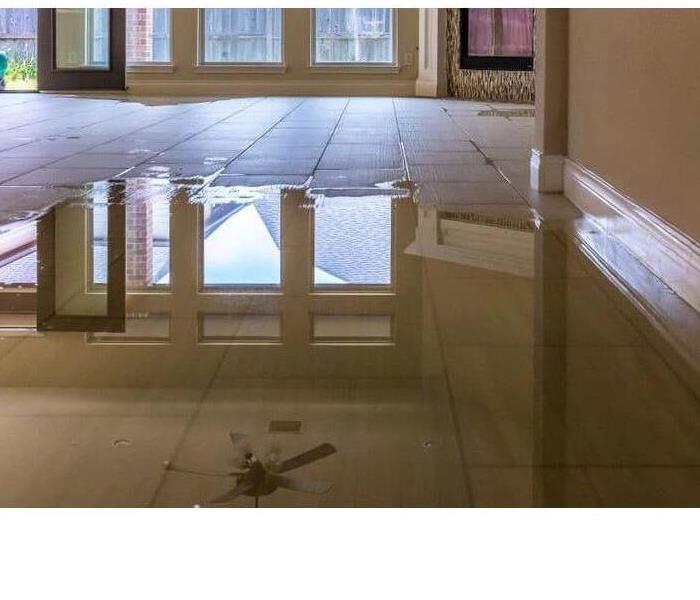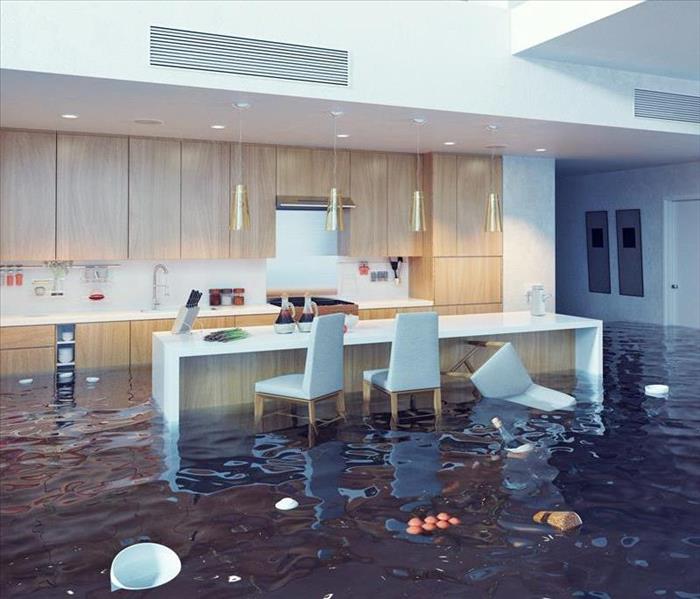Recent Water Damage Posts
Navigating Winter Woes: How SERVPRO Levittown Can Rescue You When Pipes Burst
11/29/2023 (Permalink)
As winter blankets the world in a shimmering coat of frost, the season's beauty can sometimes be accompanied by unexpected challenges. One such challenge that homeowners dread is the bursting of pipes. Whether due to freezing temperatures or other unforeseen circumstances, burst pipes can wreak havoc on your property, causing water damage and potential mold issues. In this blog post, we'll explore the common reasons behind burst pipes during winter and discuss why hiring a restoration company like SERVPRO Levittown is crucial for effective cleanup and restoration.
Understanding the Causes:
- Freezing Temperatures: Winter's freezing temperatures can lead to water inside pipes expanding and contracting, causing stress on the pipes. Over time, this stress weakens the pipes and makes them susceptible to bursting.
- Poor Insulation: Inadequate insulation around pipes, especially those in attics, basements, and crawl spaces, can expose them to extreme temperature fluctuations, increasing the risk of bursting.
- Old or Corroded Pipes: Aging pipes or those corroded due to mineral deposits are more prone to bursting. Regular maintenance and inspection can help identify and replace weakened pipes before they become a major issue.
Why SERVPRO Levittown:
- Swift Response: When disaster strikes, time is of the essence. SERVPRO Levittown understands the urgency of water damage situations and provides a rapid response to mitigate further damage.
- Professional Assessment: Trained technicians from SERVPRO conduct a thorough assessment of the water damage, identifying affected areas and assessing the extent of the damage. This allows for a targeted and effective cleanup plan.
- Advanced Equipment: SERVPRO Levittown employs state-of-the-art equipment for water extraction, drying, and dehumidification. This ensures that your property is thoroughly dried to prevent mold growth and structural damage.
- Mold Remediation: Burst pipes often lead to moisture accumulation, creating an ideal environment for mold growth. SERVPRO Levittown not only addresses the immediate water damage but also provides comprehensive mold remediation services to safeguard your home's air quality.
- Insurance Liaison: Dealing with insurance claims can be overwhelming. SERVPRO Levittown works closely with insurance companies to streamline the claims process, making the restoration journey smoother for homeowners.
When winter takes an unexpected turn and your pipes burst, the aftermath can be overwhelming. Entrusting the cleanup and restoration process to professionals like SERVPRO Levittown ensures a thorough and efficient recovery. From swift response times to advanced equipment and comprehensive services, SERVPRO is your ally in navigating the challenges of water damage during the winter season. Don't let burst pipes dampen the spirit of winter—let SERVPRO Levittown bring your home back to its pre-damage glory.
Your Basement is doomed in a Flood: Tips for Water Damage Prevention
3/15/2022 (Permalink)
Your Basement is doomed in a Flood: Tips for Water Damage Prevention
It's no secret that flooding is one of the most devastating and widespread natural disasters. Every year, we see houses and communities take a beating from floods all over the world. If you live near water or in an area prone to flooding, you know how important it is to be prepared for when disaster strikes. In this article, we will give you some tips on how to prepare your basement for flood damages!
Block Your Basements Entrance
If your basement is not waterproof, then the best thing to do is block off its entrance. The best way to accomplish this is by adding a waterproof door. This will ensure that water doesn't enter your basement, even if it's raining heavily outside! This might not stop the water from getting in if the flood is really severe however this is a step that you should always take as it may end up saving your basement.
Check for Cracks near The Basement
Cracks in the structure of your house near the basement may act as entry points for the flood water so it is important to cover those cracks. You can use either filling concrete or epoxy to seal the cracks.
Get the Carpet Off
If there is a basement in your carpet then you need to get it off ASAP. Wet carpets can leave a bad smell which would be very difficult to get rid of especially if your carpet is in the basement. Not to mention the hard work and time it will take to dry the carpet.
Make sure there are No Electronics in the Basement
Electronic are very sensitive to water so it's best if you don't have them in the basement. So if your basement is like your man cave where you play video games all day long, it’s time to shift your PlayStation to the first floor. Make sure there is nothing valuable in the basement as it may be the most effected by flooding.
Prepare Everything for When the Flood Is Over
Keep the bucket and suction pumps ready for when the flood is over. You have to then remove the water as soon as possible otherwise it can not only damage the foundations of your house but may also stimulate growth of mold in the house which will eventually lower the value of your house.
Use Fans and Dehumidifiers to Dry Out Your Basement
After you remove all the water from your basement, it is important to dry out the area with a dehumidifier and fans. This will help in removing any residual moisture that may be left behind after the flood. It's also very important to keep checking on this part of recovery as if there is still some water or humidity in your house it can lead to mold growth which we've already mentioned is not good for health nor does it smell nice!
Get SERVPRO to Help With Water Damage Restoration
If you're not the do it yourself type and don't want to deal with all this mess, SERVPRO is there for you. We will be your best bet when it comes to water damage restoration as we have dealt with everything from floods to broken pipes!
Identifying Causes of Water Damage Is Important
3/15/2022 (Permalink)
Identifying Causes of Water Damage Is Important
Water damage is one of the most common home disasters to occur. It can be caused by a number of factors, but often times it is due to improper maintenance or installation of plumbing fixtures. Preventing water damage begins with identifying the causes and implementing strategies that will help you avoid it in the future.
Leaking Roof
One of the most common causes of water damage is a leaking roof.
This can be caused by loose or missing shingles, worn out caulk around chimneys and skylights, or broken flashing where roofs meet walls. Whatever the cause might be you should always try to identify it as soon as possible in order to prevent further damage from happening. This includes taking note of how much time has passed since there was last heavy rainfall so that you have an idea about what kind of repairs need to happen during drier weather when trees lose their leaves and your house is less likely to get damaged again due to foliage contact with your home's exterior. Once any leaks are repaired immediately look for other potential areas where water may seep through the roof and check them as well.
Faulty Plumbing Fixtures
Another common cause of water damage is faulty plumbing fixtures like sinks, tubs, or toilets that are not properly installed. These can lead to water leakage behind walls which may result in rotting wooden studs , mildew underneath flooring materials, warped sub-floors , peeling paint on interior surfaces etc. If you suspect any issues with your home's plumbing be sure to have it inspected by a licensed plumber so they can repair it before mold sets in.
Outdoor Water Damage - Poor Drainage Systems
Leaks from outdoor faucets often go unnoticed for extended periods because people don't normally spend much time outside during rainstorms. The best way to prevent damage from occurring is by installing a water sensor in your garden or lawn. This will activate an automated sprinkler system that can help you extinguish any potential fires before they get out of control.
Appliances That Use Water
Another major cause of water damage is leaking appliances that use water like dishwashers, washing machines, or refrigerators.
If you suspect any issues with your appliances be sure to have them inspected by a licensed plumber so they can fix the issue before mold sets in. If you are not able to afford repairs on these things right away look for cheap alternatives online without sacrificing quality and effectiveness. For example, some people even find success using dryer sheets instead of laundry detergent when doing their clothes!
Rain and Floods
Another cause of water damage is rain and flooding. If your home happens to get flooded you should not try to clean it yourself. Instead, contact professional flood remediation services in order to prevent mold growth inside the house which can be extremely hazardous for both humans and pets alike. If there are no signs of mold than simply airing out any rooms that have been affected by flooding will suffice until repairs begin. It's important that you do not use space heaters or other electrical sources when doing this because they could create a fire hazard.
When it comes down to preventing water damage in your home, identifying the causes of water damage is half the battle. The other half involves taking steps towards resolving those problems as soon as possible so they do not become an even bigger issue than they already are.
Ways to Diagnose Water Damage in a Property
3/2/2022 (Permalink)
Ways to Diagnose Water Damage in a Property
Water damage is a collective term that is coined to refer multiple impairments that have occurred due to persistent water attacks on a system thus destroying the material through various destructive processes, for instance, decaying of wood, corrosion of steel, mold or bacterial growth and so forth. Thus water damage can be problematic if not diagnosed immediately in its early destructive stages but property owners usually tend to neglect the issue as they reckon it as a consequence of either defective plumbing or may be due to structural defects.
Water damage that we notice is nothing as compared to the internal damage that it has caused the foundations of your property since most water damage begins deep in the walls leading to structural loss hence this can only be repaired by the aid of a trained professional who will not only analyze the issue but will also repair it.
So, here is how we can diagnose if the property has been damaged by water or not:
Dark or Wet Water Blotches:
The first and foremost sign that you should be looking while detecting the water damage is the wet stains of water that are usually found on the walls or ceilings. These yellowish water circlets are very easy to identify as they are quite obvious.
Inflated Drywalls:
At times the dry walls of the house, building or any other property tend to absorb moisture that is present within the walls, due to which they get swollen or simply puff out, therefore, it is imperative to check every wall to inspect for the inflated walls. These inflated walls are another sign indicating severe water damage.
Crumbling Wooden Items:
The most vulnerable material to water damage is wood as the wood fibres tend to swell and shrink. They shrink when discharge water and swell when absorb it. Swollen wood is more liable to crack and crumble down if not fixed instantly, so if you are suddenly observing your wooden furniture or any other wood-based item fractured and swollen thus you need to get it fixed promptly before this water leakage is successful in dilapidating it.
Tattered Walls:
Tattered or run-down walls are another clue for water damage. Excessive moisture within the walls makes the paint clammy and damp thus slowly and gradually, the paint starts peeling off or in some areas, it bubbles out. So if you notice patched walls or discoloured and bumping paint do not hesitate in calling water damage control department.
Mold and Bacterial Growth:
One major signal that screams "water damage" is the growth of molds, bacteria and other minute viable organisms on your property. Apart from damaging your stuff, they are also a threat to your life since they may pose some fatal health issues. Mold and bacterial growth simply tell you that the water damage is severe and needs to be examined properly.
Some numerous signs and indications may signal for water damage, some can be easily identified like the dampness of the walls, fractured ceilings while some require a professional's expertise to resolve the matter for instance terrible exterior etc. whatever the cause is, water damage is an alarming issue that must not be left unnoticed.
Your Basement is doomed in a Flood: Tips for Water Damage Prevention
1/30/2022 (Permalink)
Your Basement is doomed in a Flood: Tips for Water Damage Prevention
It's no secret that flooding is one of the most devastating and widespread natural disasters. Every year, we see houses and communities take a beating from floods all over the world. If you live near water or in an area prone to flooding, you know how important it is to be prepared for when disaster strikes. In this article, we will give you some tips on how to prepare your basement for flood damages!
Block Your Basements Entrance
If your basement is not waterproof, then the best thing to do is block off its entrance. The best way to accomplish this is by adding a waterproof door. This will ensure that water doesn't enter your basement, even if it's raining heavily outside! This might not stop the water from getting in if the flood is really severe however this is a step that you should always take as it may end up saving your basement.
Check for Cracks near The Basement
Cracks in the structure of your house near the basement may act as entry points for the flood water so it is important to cover those cracks. You can use either filling concrete or epoxy to seal the cracks.
Get the Carpet Off
If there is a basement in your carpet then you need to get it off ASAP. Wet carpets can leave a bad smell which would be very difficult to get rid of especially if your carpet is in the basement. Not to mention the hard work and time it will take to dry the carpet.
Make sure there are No Electronics in the Basement
Electronic are very sensitive to water so it's best if you don't have them in the basement. So if your basement is like your man cave where you play video games all day long, it’s time to shift your PlayStation to the first floor. Make sure there is nothing valuable in the basement as it may be the most effected by flooding.
Prepare Everything for When the Flood Is Over
Keep the bucket and suction pumps ready for when the flood is over. You have to then remove the water as soon as possible otherwise it can not only damage the foundations of your house but may also stimulate growth of mold in the house which will eventually lower the value of your house.
Use Fans and Dehumidifiers to Dry Out Your Basement
After you remove all the water from your basement, it is important to dry out the area with a dehumidifier and fans. This will help in removing any residual moisture that may be left behind after the flood. It's also very important to keep checking on this part of recovery as if there is still some water or humidity in your house it can lead to mold growth!
Get SERVPRO to Help With Water Damage Restoration
If you're not the do it yourself type and don't want to deal with all this mess, SERVPRO is there for you. We will be your best bet when it comes to water damage restoration as we have dealt with everything from floods to broken pipes!
When Should You Contact a Water Damage Restoration Company?
1/30/2022 (Permalink)
When Should You Contact a Water Damage Restoration Company?
If you’ve experienced water damage in your home, it can be hard to know where to start. Should you try to clean up the mess yourself? Call a plumber? Contact an insurance company? Get estimates from several restoration companies? The answer is that first and foremost, if there is standing water or significant amounts of water coming out of your pipes, contact a professional 24-hour emergency service ASAP. Once the immediate danger has been taken care of, call one or two reputable restoration companies for estimates on how much it will cost to get your home back into shape.
When should you call a water damage restoration company? You might be asking yourself that question because your basement flooded and the carpet is soaked or your washing machine overflowed and leaked into the kitchen. Not sure if you need to call a water damage restoration company? We're here to help! In this blog post, we'll discuss when it's time to contact a professional for assistance with water damages in your home so that you can reduce any long-term effects of these types of disasters.
When the Damage Is Too Much For You to Handle On Your Own
Sometimes the damage can be too much to handle for you on your own and you know you need a professional to get rid of your water problem. If the damage is too much for you to handle on your own, call a water damage restoration company immediately.
When You Have Standing Water or Pipes That Are Leaking
If there's standing water in your home or if there are pipes that have been compromised and are leaking, it's important that you contact a 24-hour emergency service as soon as possible so they can get out to your location ASAP. The longer the water sits inside of your walls or carpeting, the more likely it will be that mold will begin to grow and/or cause structural problems within the building itself. If this occurs, the damage repairs may be more expensive.
When You Need a Fast Turnaround Time for Repairs to Your Home or Business
Not only is it important that you contact a professional as soon as possible, but you also want to find one who can offer same-day service or at least 24 hours’ notice of when they plan on arriving for repairs. The faster the turnaround time from the moment your call has been made until help arrives, the better off your home and property will be in terms of minimizing any further long-term effects after water damage occurs. Also keep in mind that if there are outlets or appliances which have been destroyed due to this occurrence, not calling a restoration company quickly enough could mean being without these vital amenities for quite some time.
Your Basement is doomed in a Flood: Tips for Water Damage Prevention
12/1/2021 (Permalink)
It's no secret that flooding is one of the most devastating and widespread natural disasters. Every year, we see houses and communities take a beating from floods all over the world. If you live near water or in an area prone to flooding, you know how important it is to be prepared for when disaster strikes. In this article, we will give you some tips on how to prepare your basement for flood damages!
Block Your Basements Entrance
If your basement is not waterproof, then the best thing to do is block off its entrance. The best way to accomplish this is by adding a waterproof door. This will ensure that water doesn't enter your basement, even if it's raining heavily outside! This might not stop the water from getting in if the flood is really severe however this is a step that you should always take as it may end up saving your basement.
Check for Cracks near The Basement
Cracks in the structure of your house near the basement may act as entry points for the flood water so it is important to cover those cracks. You can use either filling concrete or epoxy to seal the cracks.
Get the Carpet Off
If there is a basement in your carpet then you need to get it off ASAP. Wet carpets can leave a bad smell which would be very difficult to get rid of especially if your carpet is in the basement. Not to mention the hard work and time it will take to dry the carpet.
Make sure there are No Electronics in the Basement
Electronic are very sensitive to water so it's best if you don't have them in the basement. So if your basement is like your man cave where you play video games all day long, it’s time to shift your PlayStation to the first floor. Make sure there is nothing valuable in the basement as it may be the most effected by flooding.
Prepare Everything for When the Flood Is Over
Keep the bucket and suction pumps ready for when the flood is over. You have to then remove the water as soon as possible otherwise it can not only damage the foundations of your house but may also stimulate growth of mold in the house which will eventually lower the value of your house.
Use Fans and Dehumidifiers to Dry Out Your Basement
After you remove all the water from your basement, it is important to dry out the area with a dehumidifier and fans. This will help in removing any residual moisture that may be left behind after the flood. It's also very important to keep checking on this part of recovery as if there is still some water or humidity in your house it can lead to mold growth which we've already mentioned is not good for health nor does it smell nice!
Get SERVPRO to Help With Water Damage Restoration
If you're not the do it yourself type and don't want to deal with all this mess, SERVPRO is there for you. We will be your best bet when it comes to water damage restoration as we have dealt with everything from floods to broken pipes!
When Should You Contact a Water Damage Restoration Company?
12/1/2021 (Permalink)
If you’ve experienced water damage in your home, it can be hard to know where to start. Should you try to clean up the mess yourself? Call a plumber? Contact an insurance company? Get estimates from several restoration companies? The answer is that first and foremost, if there is standing water or significant amounts of water coming out of your pipes, contact a professional 24-hour emergency service ASAP. Once the immediate danger has been taken care of, call one or two reputable restoration companies for estimates on how much it will cost to get your home back into shape.
When should you call a water damage restoration company? You might be asking yourself that question because your basement flooded and the carpet is soaked or your washing machine overflowed and leaked into the kitchen. Not sure if you need to call a water damage restoration company? We're here to help! In this blog post, we'll discuss when it's time to contact a professional for assistance with water damages in your home so that you can reduce any long-term effects of these types of disasters.
When the Damage Is Too Much For You to Handle On Your Own
Sometimes the damage can be too much to handle for you on your own and you know you need a professional to get rid of your water problem. If the damage is too much for you to handle on your own, call a water damage restoration company immediately.
When You Have Standing Water or Pipes That Are Leaking
If there's standing water in your home or if there are pipes that have been compromised and are leaking, it's important that you contact a 24-hour emergency service as soon as possible so they can get out to your location ASAP. The longer the water sits inside of your walls or carpeting, the more likely it will be that mold will begin to grow and/or cause structural problems within the building itself. If this occurs, not only do you run a higher risk of developing health issues due to exposure to growths caused by mold spores but also having all this water damage repaired will be a lot more expensive.
When You Need a Fast Turnaround Time for Repairs to Your Home or Business
Not only is it important that you contact a professional as soon as possible, but you also want to find one who can offer same-day service or at least 24 hours’ notice of when they plan on arriving for repairs. The faster the turnaround time from the moment your call has been made until help arrives, the better off your home and property will be in terms of minimizing any further long-term effects after water damage occurs. Also keep in mind that if there are outlets or appliances which have been destroyed due to this occurrence, not calling a restoration company quickly enough could mean being without these vital amenities for quite some time.
Ways to Secure Your Home during a Flood
12/1/2021 (Permalink)
The last thing you want to worry about when there is a flood in your area is whether or not your home will be safe. Floods can happen anywhere and at any time, so it's important to take precautions beforehand to make sure that you are fully prepared for the worst. That being said, here are some ways you can secure your house during a flood:
Grade your lawn away from the house
If you have a slope in your lawn leading up to the house then this will make it easier for water to enter. Take some time before the flood season begins and grade your yard away from your home so that there is less chance of water collecting around your foundation.
Install window well covers
Floods tend to happen quickly, which means that if there's anything obstructing windows on lower levels (like window wells) - they could prevent people inside the home from getting out safely when needed. To avoid any potential risks or problems, install window well covers that can be removed easily by anyone who needs them during an emergency situation. This way everyone stays safe while waiting for rescue teams arrive!
Create sand bags
Sandbags are great because they can be taken down and put back up again as many times as you need them, which is perfect if there's a flood season that follows multiple storms. When first approaching your home during a flood it might look like the only thing left to do is abandon ship in favor of higher ground - but by creating sand bags around entry points (like doors) you'll greatly reduce the possibility of flooding in the home when things finally start to recede.
Leave space between siding & mulch
In severe cases, flooding can even cause mulch to start decomposing which is a major risk for mold as well as other health problems. In order to avoid these risks, leave about an inch of space around the base of your house so that water has room to flow away from it instead of collecting at its foundation. This will reduce chances of damage and ensure that everyone inside remains safe during a flood!
Block All Entrances and leave no space for the water to come in
Make sure there is no space for the water to collect around your home's foundation or windows and doors. Put anything you can find to block entrances in front of all doorways. It is important that you do not allow any gaps between items as this will encourage flooding into the house when it occurs again. This also includes allowing plenty of room around windows so that they are able to open safely during an emergency situation! If possible - leave at least a foot gap from siding on the side of your house nearest where flood waters are likely to enter (like near garage doors) so that everyone inside has enough time to escape if necessary before water rises too high within the home.
Blanket all windows with plastic sheeting so the water cannot sleep in.
Once you have blocked off entrances, it is important to protect any openings that are left vulnerable by covering them up as much as possible. If there are glass windows on your home - use plastic sheeting or tarps over top of these until the flood waters subside and remove once problem has been averted! High winds can cause this material to fly away during a storm making it even more vital that everyone inside knows how best to secure their house properly before things get out of hand! Make sure all roof vents are securely covered just like other unprotected areas around your home's exterior too if at all possible because anything not protected will be especially susceptible during floods.
Water Damage Restoration Companies like SERVPRO can save your property and its value
12/1/2021 (Permalink)
It is important to know that there are water damage restoration companies out there who can help you if your property has been damaged. SERVPRO is one of the best restoration companies in the country, and they provide professional services for both residential and commercial properties. Their teams will come on site with all necessary equipment to begin their work as quickly as possible, so your property can be restored back to its original condition. Whether it's water damage or fire damage, SERVPRO professionals will help save your property!
How Can a Water Damage Restoration Company Boost the Value of Your Property?
Water damage restoration companies can help save your property, but it's also important to know that a water removal company can make sure you get the best price possible when selling. If your home or business has been damaged by flooding from severe weather conditions, SERVPRO professionals will take care of everything for you. They'll extract all standing water and restore your property back to its original state. If you're selling, having a professional water damage restoration company come in and make your home look good as new will give the buyer peace of mind that everything is up to par. They'll be more confident buying from you, resulting in better offers!
Restoration companies not only dry up your house, they also remove mold and the results are usually long lasting when there is a professional company involved. This can also increase the resale value of your house. Clean sewerage system and up to date and well maintained plumbing all add up to the overall value of the property.
If You Are Looking For a Water Damage Restoration Company In Your Area Then What Should You Do
Water damage restoration companies are available all over America, so don't hesitate to contact one if your property has been damaged by any kind of water or flooding event. Not only can they help save your home or business with their services but they can also increase the value when it comes time for resale. Searching online is easy too; if you are in Woodbury, then you can get in touch with professional at SERVPRO. You can contact us anytime of the day or night, and we'll come onsite right away. We work around the clock to make sure your property is drying up as quickly as possible!
Without proper restoration after water damage, you will never be able to get the right price for your house. SERVPRO is one of the best water damage restoration companies in America and they will make sure you get maximum dollar for your home or business.
A Water Damage Restoration Company Like SERVPRO Can Be A Good Investment For Your Property!
Water damage can cause a lot of stress, but you don't have to go through it alone because there are many water removal services available to help save your property and increase its value when it comes time for resale. If you want peace of mind that everything will be alright after suffering from any flooded area, then we suggest getting in touch with SERVPRO today.
Things that a water restoration company can do for you
12/1/2021 (Permalink)
When you have water damage in your home, it is very important to get the issue resolved quickly. This will help prevent mold and mildew from growing on wet surfaces around your house. It can also reduce the chance of more serious health problems when they are not treated properly. If you need a water restoration company to come out and take care of this for you, here is what they might do:
Assess damage to belongings
They take a look around your home to see what might be ruined, including furniture and flooring materials. This helps you know how much restoration work needs to happen in order for things to go back to normal again.
Remove sopping carpets
They will take out any wet carpeting and get it dried in a way that prevents mold from growing on the fiber. In some cases, they may need to be replaced. This is only if the water damage was severe enough for this to happen. If not, then you can save some money on the restoration work.
Clean and sanitize surfaces
They will wash down any walls or other places where water damage happened to remove dirt, mildew, mold, bacteria and other germs that might cause illness for you or your family members if they are not killed through cleaning. Then, they leave everything to dry out in the open air for a while.
Fix any water damage that happened
If there was plumbing damage or some other type of issue, they can fix it right away so you don't have to worry about further problems with the house down the road when these issues are ignored. This is necessary if your home is going to be safe for you and your family.
Provide warranty on all work
They offer warranties for any restoration services they do, which means if anything goes wrong in the future then they will be able to come back and fix it for you.
Dehumidify the air to reduce moisture levels in your home
When you find out that there is a problem with water damage, it is important to take care of this as soon as possible. If it goes untreated for too long, then your house may start to smell bad or have mold growing on the surfaces. This is when you should call a water restoration company to come out and do the work for you in an urgent manner. They will be able to remove the standing water, which means that there won't be any more surface damage done or mold growing on your walls or furniture.
These are just some of the things that they might do for you when it is time to call in professionals. There are many other services out there as well so be sure to find out what else they can offer in addition to the ones mentioned above.
Can Water Damage Restoration Be Done In A DIY Project
10/12/2021 (Permalink)
Can Water Damage Restoration Be Done In A DIY Project
Water damage restoration can be a daunting task to tackle on your own. We recommend that you contact professionals for water extraction, carpet cleaning and mold remediation caused by flood. However if you are someone who wants to take on a DIY water damage restoration project then you can do that as well. However if you want to take on a DIY project for water damage restoration then it is better to do it if the flood is low in intensity.
The work for a DIY water damage restoration project is much easier and simple if the flood has low intensity. If you want to do it yourself, experts recommend using fans and dehumidifiers as soon as possible after the flooding has receded. Doing this will help dry out wet carpets, walls or other building materials that could result in mold growth if left untreated over time.
Many homeowners struggle with how they can fix their water damaged homes themselves but there are some things which should be done by professionals like carpet cleaning. Water damage repair may seem easy because of shows on TV however professional assistance is recommended when dealing with high level floods such as those caused by hurricanes where sewage pipes have been broken and raw sewage contaminated your home. For any food or water damage restoration project it is best to contact a professional.
There are some things which can be done by yourself and they include:
-Turning off your electrical power as this may become hazardous when dealing with flood waters that contain sewage, chemicals, mud etc. If you do not know where the main switch box is for electricity in your home then turn off all of the fuses at once using circuit breakers (not individual switches). Your meter should also be turned off if there is no power on or after a major storm event. Once these steps have been taken make sure everyone who enters does so wearing rubber boots and gloves before reaching any equipment like air conditioner units which could contain very dangerous fumes from mold infestation under the hood.
-Once power has been turned off you need to turn on all of the faucets in your home so that water can be removed from them and will not fill up with stagnant flood waters. This is done by opening each tap and allowing it to drip slowly into a container (i.e.. sink or bathtub) until no more air bubbles appear when looking at the end of spout where water comes out, then close the taps tight again before turning back on electrical appliances like dishwasher, washing machine etc. The reason for this? Air holds moisture which is why dehumidifiers work better than fans alone. By allowing these appliances to run they will help remove any excess humidity left after flooding events
After cleaning up the initial mess, you need to find out where water is coming from. Water damage restoration can be completed by yourself if it's not too severe but some things should still be done by professionals like sewage cleanup. This includes checking for any cracks or holes in your roof that may have caused excess rainwater to enter your home after a storm event and causing further damage within the structure of your building which could result in mold growth over time due to high humidity levels left behind even though power has been cut off.
How To Prep Your Home For The Winter
9/8/2021 (Permalink)
How To Prep Your Home For The Winter
Summers are over and fall is officially here. This means that the weather is going to get colder and you have to prepare your home to ensure warmth and safety. Here are some of the most important steps you can take to prep your home for the winter season.
#1. Seal Your Windows And Doors
It is important to notice small openings in your doors and windows and seal them before the winter season arrives. These openings let in chilly air in the winters that can make your house even colder. Apart from that, water can also seep in if it rains or snows.
So, make sure to fill all these gaps with mortar or silicone caulk so that no cold air or water can get inside your home. It will ensure your home stays warm and you can stay cozy.
#2. Clean Your Gutters
You can do this yourself or call a professional to do it instead. This is because gutters collect debris all year long. If they are not cleaned then water can back up. This can cause roof damage and water damage.
So, make sure that before the weather gets even colder you clean out all the gutters from your home. This will reduce the risk of floods and water leaks in your home during the winter season.
#3. Extend Your Downspout
Too much water can cause a lot of damage to the foundation of your property. This is why you should add extensions to your downspouts before the winter season. Doing so will ensure that the water runs three to four feet away from the foundation in your home.
In the long run, your foundation will be safe from water damage and your home will not be prone to leaks or flooding. Winters tend to bring rain and snow so an extension is an essential item you should have.
#4. Add Insulation To Your Attics And Basements
Insulation ensures that the warm air stays inside your home during the winter season. Attics and basements can tend to get colder than the rest of the house. This is why you should think about adding insulation to prep your home for the winter season.
However, you should not attempt to do this on your own. It is better that you call a professional. They will do it at a reduced cost and also do a skilled job. This way you will be able to enjoy the insulation for a long time to come.
So, if you have chilly basements or attics then it is time for some insulation.
Final Words
We should adapt ourselves and our homes to the changes in the weather. Doing so ensures that we are living in a safe home that provides us with everything we need despite the weather.
If you want to prep your home for the winter season then get it done by our experts at SERVPRO. For more information about our services, feel free to get in touch with us now.
3 Reasons Your Basement Is Flooding
3/15/2021 (Permalink)
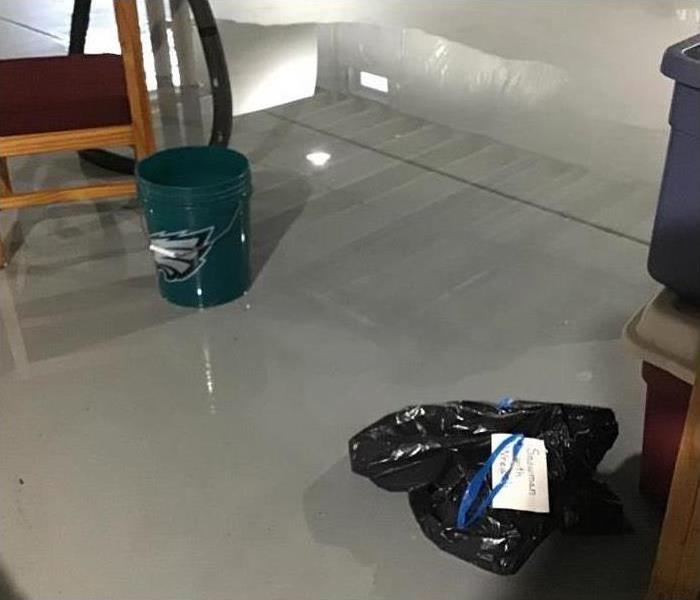 Basement water damage in Dunlap, PA.
Basement water damage in Dunlap, PA.
3 Reasons Your Basement Is Flooding
It can be hard to remain calm when your basement in Dunlap, PA, fills with water. When flooding occurs, it is important to act quickly to mitigate any damage caused. You should contact trained water restoration specialists as soon as possible so they can assist you with the proper cleanup methods.
You may be wondering how the water made its way into your basement so that you can prevent future occurrences. Here are three common reasons your basement may have trouble staying dry.
1. Poor Foundation Drainage
The property around your home should be designed to lead water away from your foundation. Without proper drainage, rain and groundwater can easily enter your basement through cracks or holes. Especially during heavy rain or rapid snowmelt, you could see the water begin to rise very quickly. A proper foundation drainage system can help avoid a basement flood and should include:
- Gutters with downspouts and splash blocks
- Proper yard grading
- Foundation drain tile
2. Failed Sump Pump
If your basement includes a sump pit with a pump, its job is to draw water from the ground and carry it away from your home. If your system fails, whether due to a power outage or to damage to the pump, you may see a lot of water flooding into your lowest level. If your power is on, many sump pumps include an alarm to alert you when the pump cannot keep up or isn't working.
3. Backed-Up Sewer
When heavy rains hit your area, it can easily lead to the sewer backing up into your home. Once the sewer system is overloaded with water, sewage flows back toward your home instead of away. The overflow will likely end up entering through a floor drain or toilet and can create quite a mess. With a rapid influx of water, you may even end up requiring pipe repair in your home as a result.
Knowing the cause can help you prevent future flooding in your home. Be sure to examine and address any issues with your drainage system and sump pump to help keep your basement dry.
Concepts To Understand When Dealing With Business Interruption Insurance
2/17/2021 (Permalink)
 Sometimes, business interruption insurance can be used to cover any extra expense.
Sometimes, business interruption insurance can be used to cover any extra expense.
Read The Following Terms and Your Policy Before Trying To File A Claim
Many different disasters, such as severe flooding, can result in business interruption. Whether the water comes from a broken pipe or a hurricane, your company will probably need to shut down while a water remediation company fixes the damage. If you find yourself in this situation, it is important to know the various terms you will find on your business interruption insurance policy.
Business Income
Your policy will cover reduced business income that is a direct result of the flooding. Business income is calculated using:
- Typical net income
- Normal operating expenses
Actual Sustained Loss
This type of insurance covers your Croydon Heights, PA, business from any actual loss sustained due to flooding. This means you will only receive funds if you experience a disaster that directly contributes to your inability to run your business for enough time that you experience a loss of income. However, the amount of funds you receive is subject to the specifics of your situation.
Period of Restoration
Insurers are only responsible for your income that was lost during the period of restoration. This is the time from when the damage occurs to when the building should reasonably be operational again.
Extra Expense
Sometimes, business interruption insurance can be used to cover any extra expense. These are expenses incurred during the period of restoration that you would not have experienced if your business had been operational.
Service Interruption
Certain policies will allow their clients a service interruption extension for their period of restoration if they do not have the necessary utilities to operate their business. This extension does not require that clients name the utility providers as an added insured on their policy.
Understanding these crucial terms is critical to knowing whether your interruption insurance will cover the time you were shut down due to large water damage or another disaster. Make sure you read about these terms and your policy before trying to file a claim.
Why Water Heaters Make Noise
1/11/2021 (Permalink)
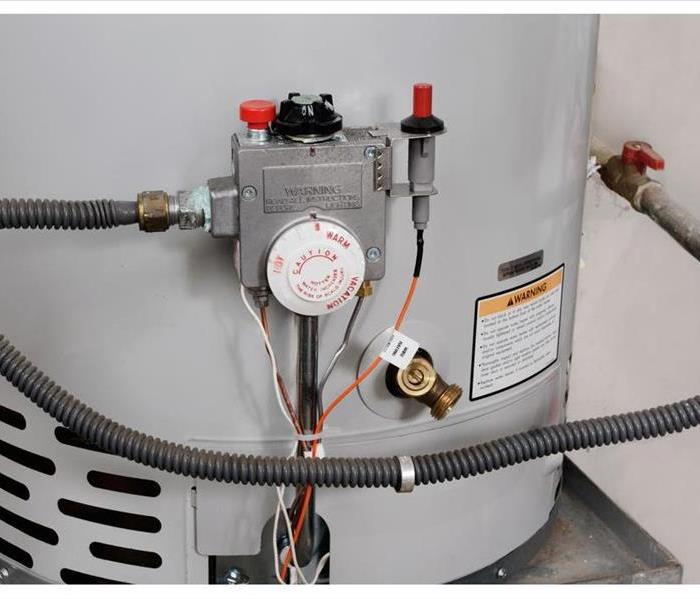 Why water heaters make noise
Why water heaters make noise
Why Water Heaters Make Noise
Determining what's causing your water heater in Croyden, PA, to make noise can be difficult. Understanding the potential causes and what sounds they make can help you locate the problem more easily. Some of the sounds your heater can make are:
- Knocking
- Screeching
- Popping and rumbling
- Humming
- Tapping
Water Hammering
Turning water on and off can cause pipes to hit the wall, making a knocking sound. This is called water hammering. A water hammer arrestor can protect your walls and stop the noise.
Partially Closed Valve
Water that is having to squeeze through a small opening can make a screeching noise. This occurs when a valve is partially closed. Checking to make sure all valves are fully opened will solve this problem.
Sediment
An older tank may develop a buildup of sediment. Sediment at the bottom of water heater can make a lot of noise when heating. This is because water trapped under the buildup is working its way to the surface. It can also make a rumbling sound as debris moves around. This can be solved with a water heater flush to clean out the buildup.
Electric Heater Element
The elements in electric heaters can produce a humming noise as they move around in the tank. Tightening the element will reduce vibrations and stop the sound.
Heat Traps
Heat traps directly the flow of water, preventing it from going the wrong direction. It is normal for them to make a tapping sound. If the sound is bothersome, you may be able to replace it with another type of valve that will be quieter.
Paying close attention to the sounds your water heater is making can be a big help in figuring out the problem. Be sure to check for water hammering, partially closed valves, sediment, a loose electric heater element, and heat traps. Once you discover what's causing the problem, stopping the noise should be easy.
4 Steps for Cleaning Your Flooded Basement
12/22/2020 (Permalink)
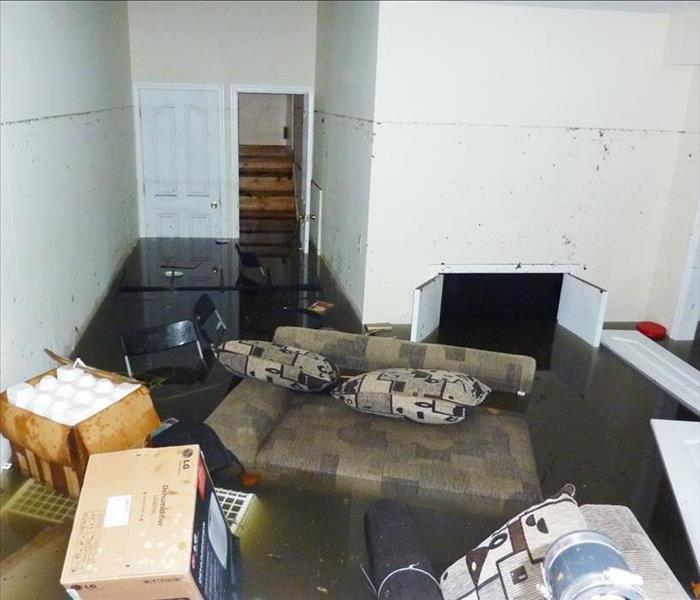 A flooded basement is a serious problem
A flooded basement is a serious problem
Ways To Be Prepared For A Basement Flood
Have you ever discovered water in your home’s basement in Pinewood, PA? Basement flooding can be a serious problem but being prepared can help you keep your head above water.
1. Stay Out of the Water.
Look for the leak while keeping your safety in mind. Never wade into a basement flood. If you cannot identify where the water is coming from, you cannot know what is in it. It could be contaminated. It is also possible that the water has come in contact with your home’s wiring and could electrocute someone.
2. Shut Off the Water.
If you find the source and you can access a shut-off valve safely, turn it off. It is best to turn off your water main. This will stop any more water from flooding into your basement. Once you shut the main valve off, you can turn on sinks and let the remaining water in your pipes drain.
3. Remove the Water.
How you choose to remove water is dependent on the amount of water you with which you are dealing. If it is only a puddle, you can use a wet/dry vacuum to clean it up. However, if the amount of water is substantial, you should consider hiring an expert to come and pump the water out.
Remove any objects that have been affected by the flood, too. Leaving materials such as wet clothing and other fibers creates prime habitats for mold growth.
4. Inspect the Damage.
Even if you consider the damage minimal, you should have your basement inspected by a water damage professional. Water can get into any nook or cranny. Having an expert check for unseen damages gives you a chance to get advice on any needed pipe repair and restoration.
Basement flooding is a serious problem. Knowing the steps for dealing with it will help you get your home back to normal in the safest, fastest way possible.
4 Things To Do When Your Toilet Overflows
10/7/2020 (Permalink)
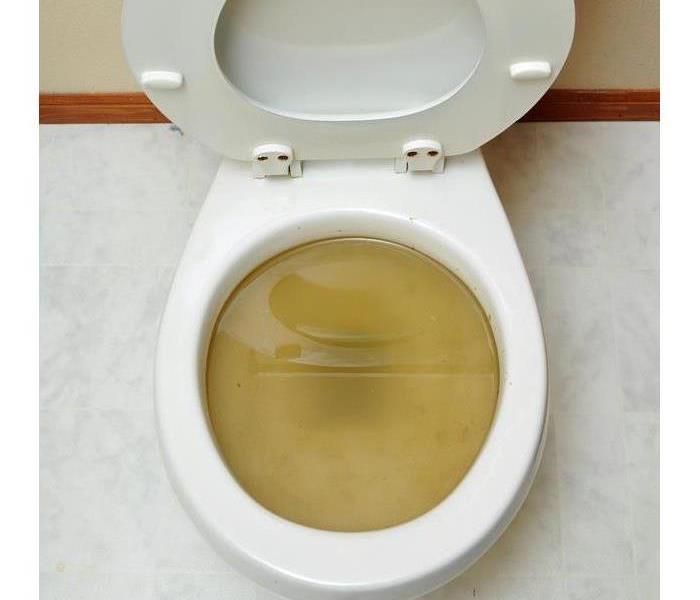 Sewer damage should be cleaned promptly
Sewer damage should be cleaned promptly
Here Are Four Important Things To Consider
When pipes clog within a home, water still has to escape. After all, the normal route is blocked but the fluid can't stop. This often results in a toilet overflow, creating water and sewer damage. Homeowners in Croyden, PA, should take this seriously, using more than a towel to clean up the mess. Residence should seek assistance quickly to stop the problem and begin remediation efforts.
1. Shut Off the Water Valve
Contact the sewage company. While you wait for arrival, cut off the water supply. There is usually a valve on the toilet. If this isn't enough then locate the main line outside. It's often on the ground. If you can't find it, refrain from using any utility source until inspection has been completed. This includes the shower, washer, and dishwasher.
2. Assess the Contamination
If sewer damage occurs, the house is exposed to category 3 water. Known as black water, this fluid contains high amounts of bacteria. Left within the drywall and floors, it becomes a hazard for microbial growth; therefore, have someone from a water remediation team test the affected zones to determine the degree of disinfection needed.
3. Tear Out Excessive Water Damage
Flooded toilet water spreads quickly, seeping into grout, walls, and carpet pads. Very easily, it permeates into porous items, making it difficult to clean. Surface chemicals such as bleach may destroy external issues, yet the formula cannot penetrate deeply into the structure. To reduce the trouble, crews should extract overly drenched sections. This includes taking out the flooring and making a flood cut into the drywall. This is usually about two to three feet above the visible concern.
4. Dry Out the Room
Pull out as much moisture as possible. This starves out fungus, decreasing the chance of mold development. Dehumidifiers should run around the clock until the areas test within a normal range. Then, restoration can begin.
Sewer damage should be cleaned promptly. Removal and airing out are important for accurate recovery.
4 Steps To Maintaining Fire Sprinklers in Commercial Buildings
9/2/2020 (Permalink)
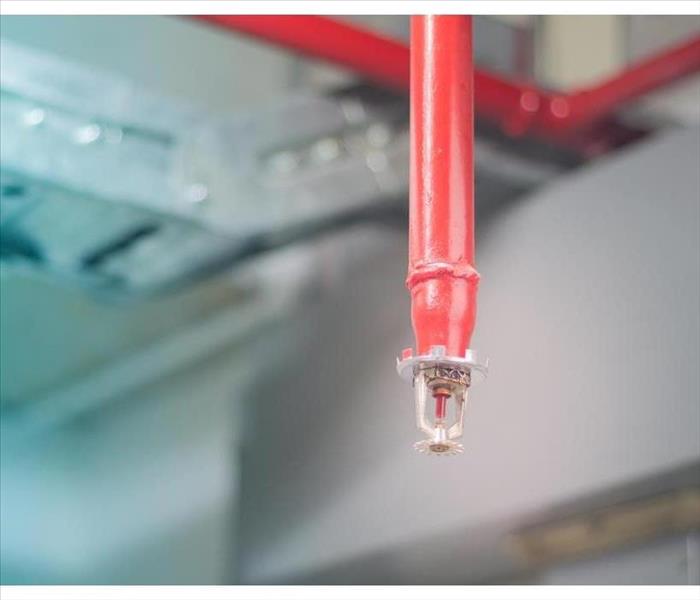 Clean your sprinkler's head
Clean your sprinkler's head
Perform The Following 4 Maintenance Procedures
In order to keep your indoor sprinkler system working reliably, you should perform regular sprinkler maintenance. Over time, sprinkler systems can develop problems or begin to malfunction. Since most systems are rarely or never used, problems can go unnoticed. If you ever experience a fire, you need your system to function properly. The best way to ensure that your sprinklers will work as expected is to perform the following four maintenance procedures.
1. Check the Water Pressure
The best laid out system will be useless if it does not have an adequate amount of water coming from the sprinkler heads. Double-check your piping to make sure everything is connected properly and that valves are set to the open position. You can do this yourself, but many companies hire a plumber to check the water pressure on a quarterly basis.
2. Clean the Sprinkler Heads
Over time, dirt, grease, and grime can accumulate over the sprinkler heads. Grease and other debris can create a film over the sprinkler head that stops or impedes the flow of water. For proper sprinkler maintenance, remove the spray nozzles and wash them in a degreasing solution. To avoid clogged sprinkler heads, avoid applying paint over sprinklers heads when painting a room.
3. Ensure Proper Water Flow
Perform a visual inspection of the building to make sure that nothing is in the way of the flow of water. There should not be any tall objects like file cabinets, bookcases, or machinery directly under fire sprinklers.
4. Perform a Professional Inspection
Once a year, you should have a fire service professional do a full inspection of your system. Properly trained experts can check for corrosion with the piping and recalibrate the system if needed.
Proper sprinkler maintenance helps protect your business, property, and employees in the event of a fire. If you have experienced fire damage in Levittown, PA, a professional water remediation company can help get your business restored as quickly as possible.
How To Fix a Flooded Basement
5/28/2020 (Permalink)
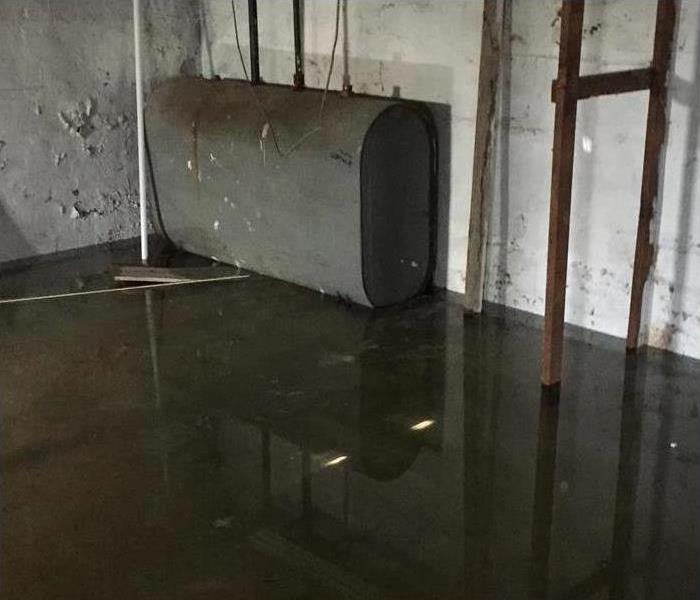 Basement water damage in Tullytown, PA
Basement water damage in Tullytown, PA
How To Fix a Flooded Basement
A basement flood can cause damage to your home, decorative items, and personal belongings. If you have a substantial amount of unwanted water, you may wonder how you will ever return things to normal. Luckily, insurance coverage usually includes damage from flooding, and industry experts can safely and effectively remove water, replace damaged items, and may even be able to restore personal belongings such as artwork. Here are five steps that most water remediation companies use to fix water damage.
1. Extract the Water
If the floodwater goes above electrical outlets, it is important that you stay out of the water completely. Going in could cause electrocution. If the water is lower, you may be able to use a plastic step stool to turn off the power. If you do not need to go into the water, then don't. Once the experts get onsite, they will begin extracting the water using specialized pumping systems.
2. Dry the Area
The faster the area dries, the less likely it is that your flooded basement will develop mold. Professionals use industrial-grade fans to circulate air and dry the area more quickly.
3. Remove Damaged Items
Electrical appliances, drywall, or flooring that has been submerged in water will likely need to be removed and replaced. Some personal items may be able to be restored. Your restoration team can discuss restoring individual items after a basement flood.
4. Clean and Disinfect
Flood water can carry germs, so the area may need specialized disinfection. The cause of the flooded basement will help determine what types of cleaning agents need to be used.
5. Restore the Area
This last step is when your home begins to return to normal. During this final stage, drywall and flooring are replaced, paint is redone, and other finishing touches are completed.
Cleanup from a basement flood requires more than just cleaning up the water. When you work with a professional water remediation company, you can quickly return your home in Tullytown, PA, to its pre-flood condition.
Do Fire Sprinklers Ever Discharge Accidentally?
5/13/2020 (Permalink)
Many businesses in Fairless Hills, PA, are required by law to maintain a functioning fire sprinkler system. When installed correctly and properly maintained, they are proven to save lives and property damage. However, some business owners are very hesitant about installing them, as they worry about water damage from an accidental discharge.
This is statistically a myth – your odds of being struck by lightning are over 5,000 times greater during your lifetime than the odds of any single sprinkler head accidentally being activated.
What Causes Accidental Discharges?
While accidental activation is rare, it does happen. There are four causes that are recognized as being most likely:
- Overheating
- Damage to the sprinkler head
- Sabotage
- Poor maintenance and corrosion
Each sprinkler head is held closed by a usually metal tab that’s designed to melt at a very narrow range of temperatures. If it’s subject to heat, either from an unusual event or bad placement near a heat source, it can be activated and cause localized flooding.
Fire sprinklers can also be damaged by careless employees or items falling from overhead. Unfortunately, even more common (but still very rare statistically) than accidental damage is employee sabotage. There have also been cases of bored employees “investigating” how the sprinklers work, causing their activation.
Fire sprinklers are designed to last for decades, but they do require some simple annual maintenance. In most cases, this must be done by a licensed fire sprinkler system inspector. You’re also required to keep some extra sprinkler system heads on-premises, and you should visually inspect them yourself a few times each year.
What Should You Do if You Get Water Damage From an Accidental Discharge?
The good news is that, since each sprinkler head activates individually, the flooding will usually be limited to a small area. Shut off the water to the system immediately and call a licensed water damage restoration specialist to inspect the damage as soon as possible. They will determine if the water has gotten behind the walls and bring in professional drying equipment to remove excess humidity, so it’s important to contact them immediately after you’ve had flooding.
How To Make an Insurance Claim After Water Damages Your Home
2/19/2020 (Permalink)
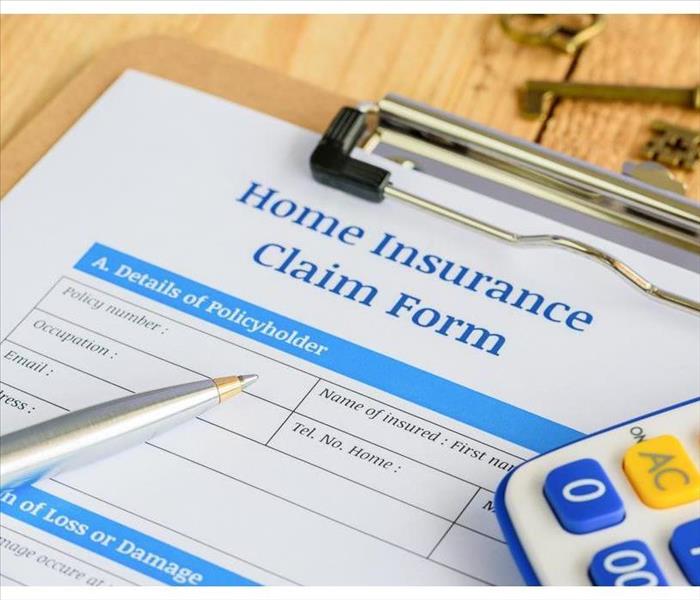 Making an insurance claim does not have to be complicated
Making an insurance claim does not have to be complicated
How To Make an Insurance Claim After Water Damages Your Home
When a broken pipe or appliance causes a flood in your Falls Township,PA, home, you may need to file an insurance claim to help pay for any repairs. This can seem overwhelming if you have never done it before. Follow the below steps to make the process go as smoothly as possible.
1. Call the Insurer Right Away
The longer the water sits in your home, the more damage it can cause. You thus need to get into action as soon as possible.
Contact an insurance representative to find out if you are covered for the damage. Most sudden emergencies, such as a pipe burst, are included in a homeowner's policy. You should ask the representative how long it will take for your insurance claim to be processed, as well.
2. Fill Out Necessary Forms
Your insurance provider is legally required to send you a claims form within a certain period of time. Fill this out and send it back to the insurer as soon as possible.
3. Schedule the Adjuster's Visit
Set up a time for the insurance adjuster to come to your home and inspect the property. Before he arrives, make a list of the structures and belongings that were affected by the flood. Give the adjuster a copy of this list along with receipts for the damaged items. You may want to take photos or videos of the property, as well. Avoid throwing out any destroyed belongings until the adjuster has left.
4. Begin Temporary Repairs
Major repairs to your property should be performed by a cleanup and restoration services company. However, before the experts arrive, you should take steps to prevent the damage from getting worse.
Making an insurance claim does not have to be complicated. By talking to your representative, completing the required paperwork and keeping track of any damaged items, you can help your home get back to normal more quickly.
4 Common Water Issues in Commercial Buildings
2/3/2020 (Permalink)
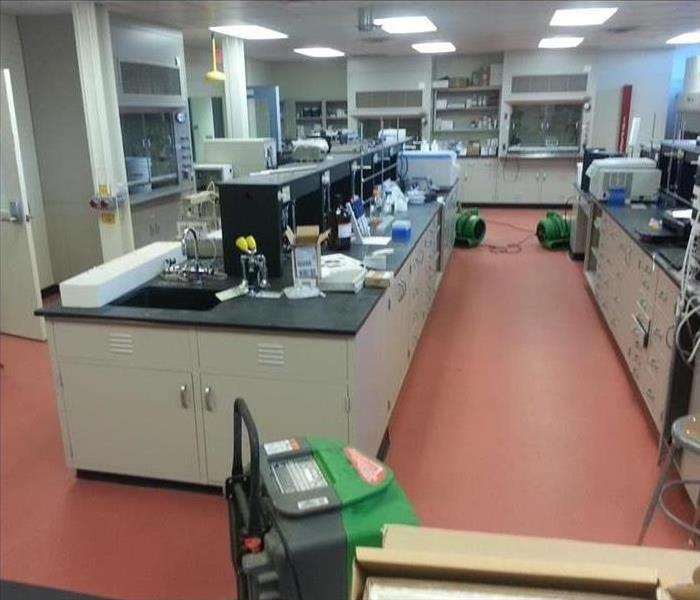 Water damage due to plumbing failure in a commercial facility in Croydon Heights, PA
Water damage due to plumbing failure in a commercial facility in Croydon Heights, PA
Four Most Common Water Issues
Every property comes with its own quirks. Your building in Croydon Heights, PA, is no exception. There are a lot of problems commercial property owners need to be on the lookout for, such as a hidden broken pipe or roof damage. Here are the four most common water issues that affect commercial buildings.
1. Fire Sprinklers
If there is a fire in your building, you want the fire sprinklers to work and are likely unconcerned about the subsequent water damage they cause in the process. When they malfunction, though, the unnecessary flooding can be frustrating. If a sprinkler goes off, it can ruin anything in its path:
- Electronic equipment
- Furniture
- Drywall
- Carpets
- Ceiling tiles
Regular maintenance and proper usage are vital for avoiding this problem.
2. Broken Pipes
Damage from a broken pipe occurs for many reasons. Pipes can freeze during the winter months, particularly if they are not properly insulated against the weather change. This problem occurs frequently in commercial buildings when the heater is turned off rather than simply turned down at the end of the day to save electricity. The minor savings on the utility bill doesn't compensate for the cost of repairing water damage, though.
3. Toilet Overflow
Public restrooms are frequently the site of water issues, particularly if a sink leaks or a toilet overflows. An overflowing toilet often results in the need for the services of water repair professionals.
4. Supply Line Breaks
Many appliances and fixtures in your building get water from a supply line. When the supply line breaks, leaks or comes loose from the place it attaches to the pipe, it can cause a lot of water damage in a short amount of time. Turn off the water with the knob on the wall and call for remediation help.
Problems such as a broken pipe or leaky toilet are frequent causes of water damage in commercial buildings. With regular inspections and maintenance, you can minimize the frequency with which these issues occur.
What To Know About Water Damage in Your Home
12/11/2019 (Permalink)
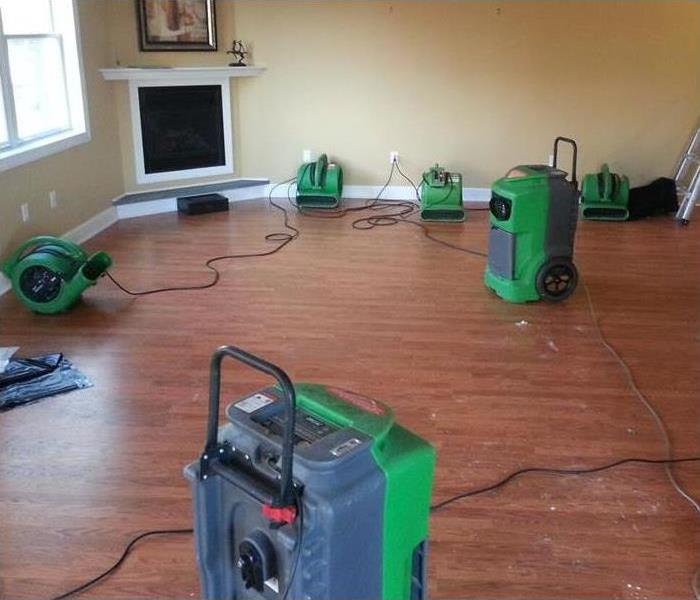 Air movers and dehumidifiers placed in an apartment in Croyden, PA
Air movers and dehumidifiers placed in an apartment in Croyden, PA
What To Know About Water Damage in Your Home
Pipe burst and other sources of water damage can cause severe harm to houses. Here are four things to know about this type of destruction.
Immediate Action Is Necessary
The longer you let the water linger in your home, the more damage it can cause. If you delay calling, emergency restoration specialists, you risk your belongings getting irreparably harmed. The continued presence of water can also lead to mold growth that can quickly spread throughout your house.
It Has Several Different Causes
There are numerous different sources of water damage. Water from natural disasters such as tropical storms, hurricanes and thunderstorms can seep into your house. You could also have a leak in a water line or an appliance. Meanwhile, sewage backups or overflowing toilets can bring both stench and water into your home.
The Cleanup and Restoration Process Is Extensive
Whether your water emergency results from a pipe burst or a severe storm, the cleanup and restoration process is typically the same. It starts with an inspection and assessment of the damage. Experts will then remove the water and dry your belongings. They will then sanitize and clean the affected areas before restoring your home to the way it was before.
You Can Take Steps To Mitigate Damage Before Help Arrives
While you should leave the major cleanup to professionals, you can take certain actions while you wait for their arrival. Any loose objects, including colored rugs, magazines and books, should be removed from the floor. You can also wipe away any excess water and turn on the air conditioning to speed up the drying process. Avoid using your vacuum or any other devices that require electricity.
A pipe burst, severe storm or appliance leak can cause major flooding in your Croyden, PA, home. If you find water damage to your house, call for help as soon as possible.
3 Signs That Your Water Heater Needs to Be Flushed
10/15/2019 (Permalink)
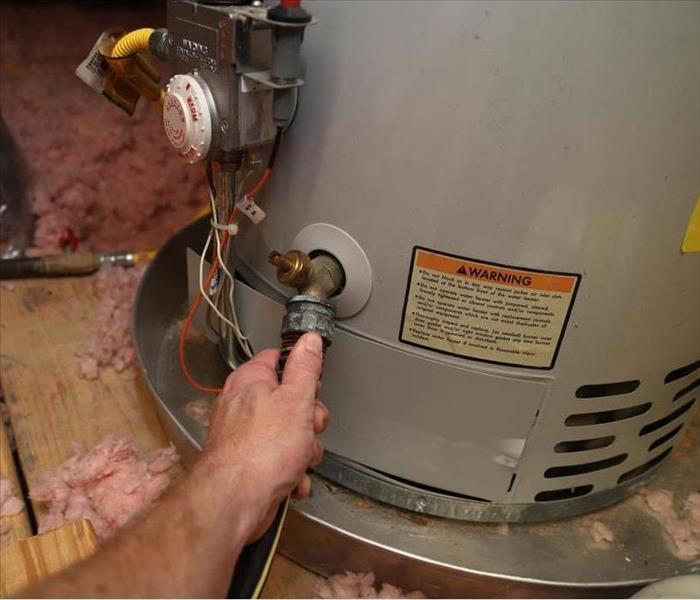 Flushing a water heater in a Fairless Hills, PA home
Flushing a water heater in a Fairless Hills, PA home
3 Signs That Your Water Heater Needs to Be Flushed
Flushing your water heater when necessary is a vital aspect of keeping it well maintained. While it’s typically ideal to flush it once a year, you may need to do so more often if your home in Fairless Hills,PA, has particularly hard water. If you’re not sure whether your unit needs to be cleaned out, the following signs may indicate that it’s time to schedule a water heater flush.
1. Delayed Reheating
One of the most common signs that your heater is due for a flush is a delay in the reheating process. When the heater takes longer than usual to reheat a tank of water, it usually indicates that there is a buildup of sediment inside of the heater. This accumulation of mineral deposits and other materials makes it more difficult for the heater to access the water and heat it efficiently.
2. Low Water Pressure
After your water heater hasn’t been flushed for a while, hard water deposits may build up and block the pipes that lead away from the heater. When these pipes are narrowed or blocked, it causes the water pressure in your home to decrease. Low water pressure can cause you to waste water and money, so be sure to schedule a water heater flush right away to keep the water in your home flowing normally.
3. Noises Coming From Heater
A noisy heater is a more obvious indicator that you need to flush out your unit. If you hear a rattling sound coming from your heater, it may be caused by an accumulation of sediment at the bottom of the heater. The water below the sediment may also begin to boil and cause you to hear popping sounds. As soon as your heater begins making noises, it’s time to have it flushed out thoroughly.
A water heater that isn’t flushed or maintained properly can lead to serious water damage. Regardless of the problem you’re experiencing, water damage restoration experts can erase all signs of harm “Like it never even happened”.
What You Can Do To Combat Water Damage
8/29/2019 (Permalink)
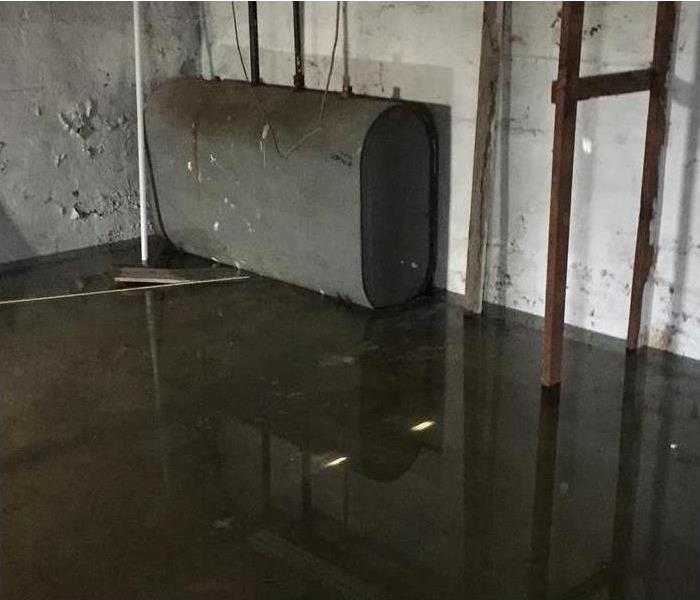 Water damage in a Fairless Hills, PA basemente
Water damage in a Fairless Hills, PA basemente
What Should You Do Before Help Arrives?
Water damage can be a homeowner's worst nightmare in Fairless Hills,PA. To minimize the impact of such an event, what should you do before help arrives? There are lots of steps you can take improve the situation.
Content Removal
In home flooding caused by broken pipes or other sources can effect the entire contents of your home, effectively your life. First, determine if you need to evacuate the area or the house. If not, try and remove what you can before it is damaged. Things like:
- lamps and tabletop items
- upholstery
- colored rugs
- loose items on the floor
- art items or important documents
Damage Control
Right away, you will want to do what you can to keep water damage from getting worse or spreading. Turn off your water if the flooding is still active. Try to mop and blot excess water if it seems safe to do so. Turn off electricity if necessary. If not, turn on air conditioning and open windows to dry out the area as much as possible. Wipe down any wood furniture and place aluminum foil or other barrier between furniture legs and the floor.
Call the Professionals
It is in your best interest to hire a water damage remediation specialist to handle the water cleanup. If you don't follow certain protocols, you may end up making it worse. There are special techniques for drying out and cleaning specific materials and items. Depending on the source of the flooding, the water may have been contaminated, so sanitation procedures are important, as well. They can also help you perform an inspection and damage assessment, which will come in handy when contacting your insurance company.
Handling water damage is best left to the professionals, but that doesn't mean you have to sit back and do nothing. Take your fate into your own hands- every small bit helps when combating the menace of water damage.
How To Clean Items Damaged by Water
6/12/2019 (Permalink)
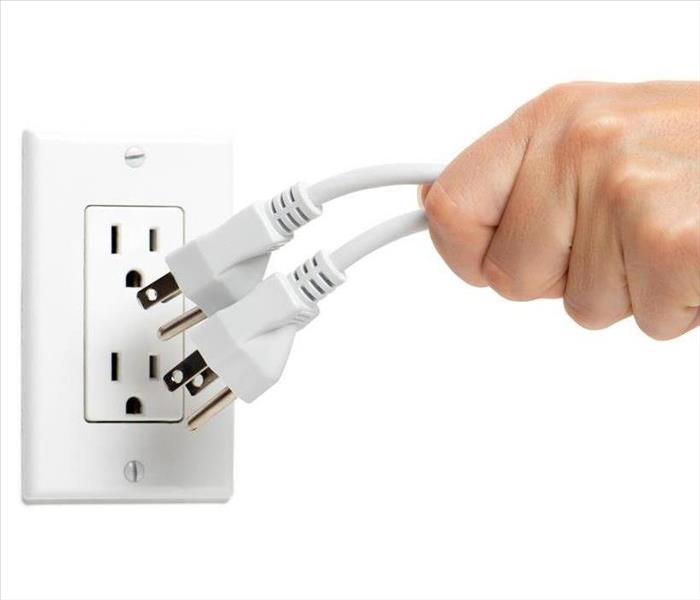 All electronic items should be safely unplugged
All electronic items should be safely unplugged
The aftermath of flooding, natural disasters and even a broken pipe can devastate personal property, sometimes to a point beyond repair. For all salvageable possessions, follow the tips below to restore them as best as possible.
Attempting Restoration
Restoration, in any case, is involved and arduous. Should you decide to restore items damaged by water in the home, the following steps should be enacted.
- Begin by turning off the power to affected rooms in order to prevent electric shock.
- All electronic items should be safely unplugged and only handled by trained professionals.
- Move desired furniture, bedding, carpeting, carpet mats and other possessions outside for drying in the open air.
- Hose off and scrub items to remove impurities.
- Scrub items with disinfectants designed to treat the type of furniture being cleaned.
- Clothing can be sent to dry cleaning specialists to remove stains and dirt.
Many items may be irreversibly damaged from water in the home. Therefore, you have to determine if saving damaged items through professional assistance is worth the effort.
Contacting Your Insurance Agent
You may not have to worry about restoring replaceable items if they are already covered under an insurance plan. If you are covered, be sure to document what items are damaged and take plenty of pictures.
Replacing Documents
With paper-based possessions — documents, books, photographs, etc. — the renewal process requires a professional water damage restoration service for best results. Through proven freeze-drying techniques, professionals can either return restored documents to you or convert them to digital files. Another great benefit of using professionals is that they have the technology to remove bacteria and unsafe chemicals from contaminated documents while protecting the integrity of the paper itself.
If you live in the Tullytown, PA, area and experience massive amounts of standing water in the home, you must act quickly if you want to salvage your belongings. By following the steps above, you can eventually restore furniture, documents and personal belongings to their pre-disaster levels, allowing you to focus on repairing the rest of your home.
3 Types of Damage Your Commercial Building May Suffer After a Flood
4/16/2019 (Permalink)
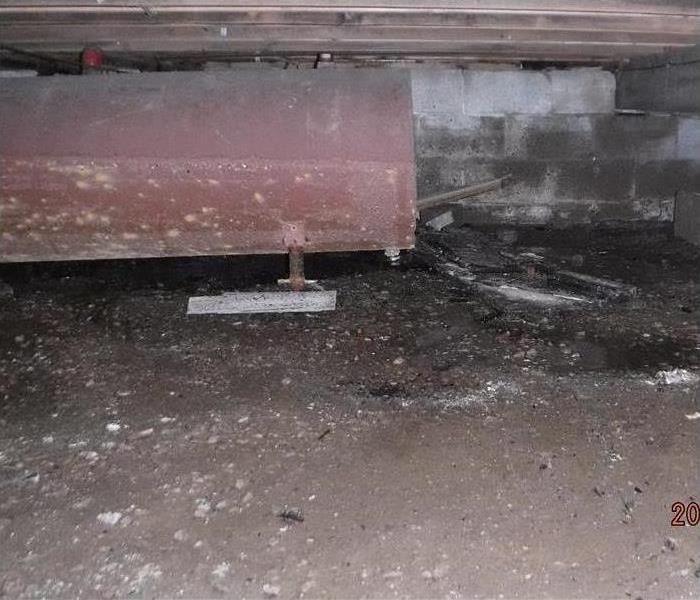 This crawl space was found with standing water. this caused mold and mildew grow quickly.
This crawl space was found with standing water. this caused mold and mildew grow quickly.
When your Croyden, PA, building business experiences flooding, the immediate results are usually obvious. Wet carpeting, standing water, and soaked office supplies are likely to be a few issues you might have to resolve. However, the moisture from a flood can continue to cause damage long after the water has been drained away. From warped wooden flooring to black mold, here are a few problems to watch out for in the aftermath of a flood at your business.
1. Water Absorption
Some building materials are porous and can absorb flood water. When this occurs, drywall and insulation can retain both moisture and odor, which can cause the rotting of whatever is contained inside the interior wall. You may want to ask your flood cleanup crew to perform a flood cut, which reveals the inside of any affected wall so the extent of the damage can be assessed and restored.
2. Mold Growth
Black mold and other types of fungi often grow after a flood due to high humidity and the presence of moisture that may remain in an area once it has been closed off. Mold may even develop where you may not spot it right away, such as in your building’s basement or in the corners of plumbing cabinetry. Once mold begins to grow and spread, it can be difficult to remove, so it is wise to have your building inspected after a flood to ensure fungi does not take hold.
3. Lingering Odors
While most types of flood damage are troubling, others are simply offensive, such as lingering odors that might remain afterward. This type of secondary damage can be especially problematic if the source of the flooding came from an outdoor or sewer source. Your storm damage and flood cleanup service technicians can target and eliminate these smells with ozone machines and other technology.
Problems like black mold and excess moisture can cause serious problems in the aftermath of a flood at your Croyden, PA, business. Being vigilant about the presence of secondary damage may help you reduce the cost of future repairs and protect your commercial interests.
What To Do With Water-Damaged Building Materials
3/13/2019 (Permalink)
Some building materials damaged by water may be capable of being restored. Here are a few guidelines regarding what homeowners should do with swelling wood, damp drywall and other building materials after a supply line break or any incident involving contaminated water.
Restoration
Some materials can be restored after exposure to water. This is particularly the case if an incident involves clean, Category One water. The following materials may be dried and restored:
- Drywall
- Metal
- Plaster
- Solid wood
After water pipe repair is complete, these materials should be thoroughly dried. Any corrosion on metal should be removed. Swelling wood may need to be sanded, scraped, refinished and possibly even retrofitted depending on the degree of damage.
Replacement
Building materials may need to be replaced after extensive water damage or incidents involving contaminated Category Two gray water or Category Three black water. Porous materials such as drywall exposed to contaminated water pose an increase mold risk and should be torn out and replaced. Other materials that may sustain irreparable damage include
- Composite or engineered wood
- Electrical components
- Insulation
These materials may be irreparably damaged or increase the risk of mold growth at a residence. Water damage restoration specialists can recommend whether any building materials or contents are viable candidates for restoration or should be thrown away and replaced.
Seek an Expert Opinion
Residential restoration experts can provide informed opinions about the cost-effectiveness of restoring building materials and the likelihood of success. In some cases, the category of water damage and extent of exposure or saturation may make it possible to restore some materials that might otherwise be discarded.
Homeowners who are uncertain whether swelling wood or other building materials are worth attempting to restore should contact residential damage mitigation and restoration professionals in Levittown, PA. These specialists can take measures to prevent further damage and offer advice regarding restoration and replacement.
Cleaning After a Flood
1/18/2019 (Permalink)
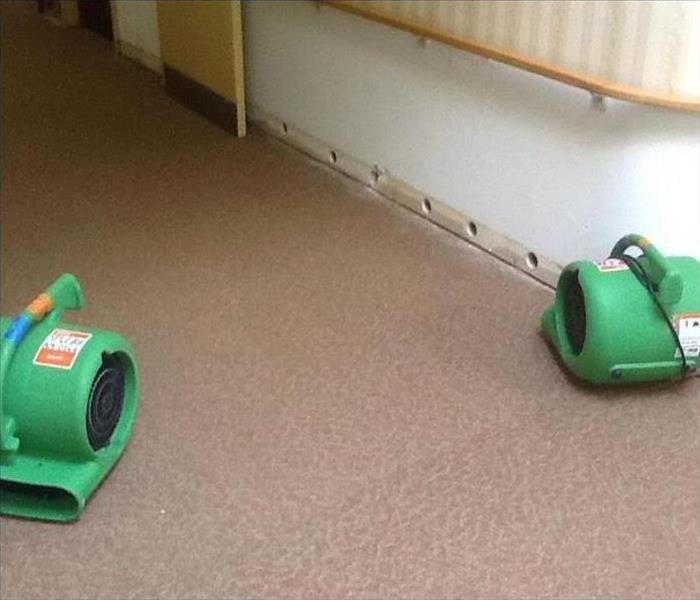 Air mover on a water damage in Fairless Hills, PA
Air mover on a water damage in Fairless Hills, PA
When floodwater in the home is gone, and most of the heavy work is finished, many Fairless Hills,PA, families and individuals want to slip back into life as they knew it before the disaster. Unfortunately, all the wood, fabric, drywall, and other materials exposed to the water have probably absorbed the liquid. Moving belongings back into your house too soon could lead to ongoing problems, such as mold growth, pest infestations, and long-term deterioration. Remember, flood water isn't clean; it needs to be handled differently than other types of water disasters, such as a broken pipe.
Focus on Safety
Before taking your first recovery steps, make sure you know how to proceed safely.
- Arrange structural, electrical, fire, and gas inspections, so you know the home is safe to enter.
- Wear sturdy, protective clothing. It's best to have waterproof protection.
- Don't mix chemicals, such as chorine and ammonia, when cleaning.
- Watch out for pests hiding in flooding, including snakes and fire ants.
If you're not sure about safety and water in the home, get more information from water damage remediation professionals and local authorities.
Contact Appropriate Professionals
Your next steps should include contacting your insurance adjuster, scheduling repairs and cleaning from professionals in Fairless Hills,PA, and making sure your electricity and gas have been turned off. With these tasks completed, move on to cleaning and disinfecting your property.
Identify the Work
Working closely with the remediation professionals, you'll separate items into at least three categories: to clean yourself, to leave for the technicians, and to discard. There are many repairs you can handle yourself. Clothing may be wet or could have a mildew smell. It's generally safe for laundering or dry cleaning those items on your own. However, expensive and structural items should be turned over to professionals. Your carpets, flooring, furniture, and walls present cleaning challenges that require specialized techniques and training. Finally, some items, such as mattresses, must be thrown out for your family's health.
Water in your home requires a lot of work even after floods recede. When you know what to do and who to call for help, that work can progress smoothly and efficiently.
Tips for Removing a Toilet Clog
12/18/2018 (Permalink)
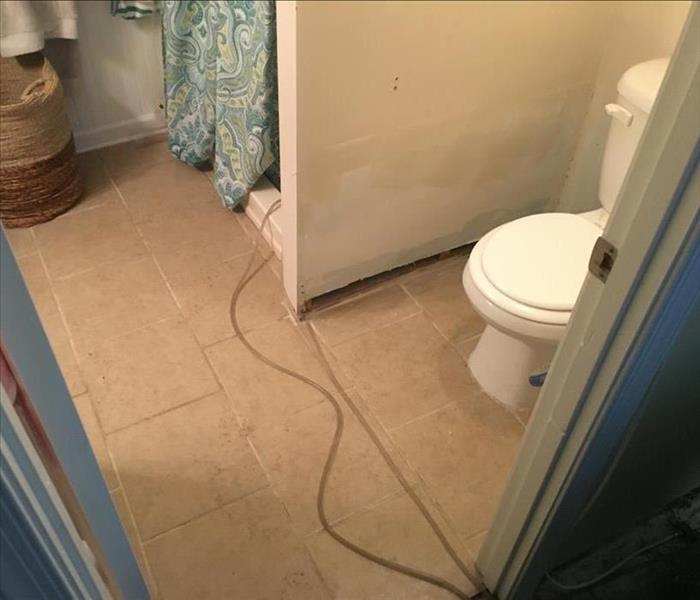 Hire certified technicians if you have a clogged toilet
Hire certified technicians if you have a clogged toilet
Tips for Removing a Toilet Clog
After taking a nice, long shower, you step onto your bath mat, and the floor is soaked. A quick assessment of the situation indicates that the overflow is coming from the toilet. This probably means that there is a clog somewhere in the pipe between your toilet and your septic tank. The following tips can help you with drain clearing and sewage cleaning.
1. Snake the Toilet
To combat toilet overflow, you will likely need to snake it. A snake, otherwise known as an auger, can be found at most hardware stores in Levittown, PA, and is pretty simple to use. You can either insert the auger into the toilet bowl itself to try to dislodge the clog that way, or you can remove the toilet so that you can reach the drain beneath it. Then turn on the shower to see if you got rid of the clog. Make sure you put old towels or newspaper on the floor first, or you may add more sewage cleaning to your to-do list!
2. Snake the Drain Cleanout
If snaking the toilet didn’t take care of the clogged pipe, you can try snaking your drain cleanout. Using a wrench, remove the cap carefully. It’s a good idea to have a bucket nearby just in case any sewage leaks out when it’s open. Snake the drain from this angle to remove the clog.
3. Call the Professionals
If the problem is still not resolved or if you’re uncomfortable using the auger, it’s time to hire certified technicians to deal with it. They can take care of the clog and clean any sewer damage that the overflow left in your home. They can also determine whether you have a larger issue, such as a tree root encroaching on your sewer line, that needs to be addressed.
An overflowing toilet isn’t a pleasant surprise, but fixing it may be simple with the right tools. If not, you can always call a plumber or sewage cleaning experts to handle it.
How To Flush a Water Heater in 8 Easy Steps
10/11/2018 (Permalink)
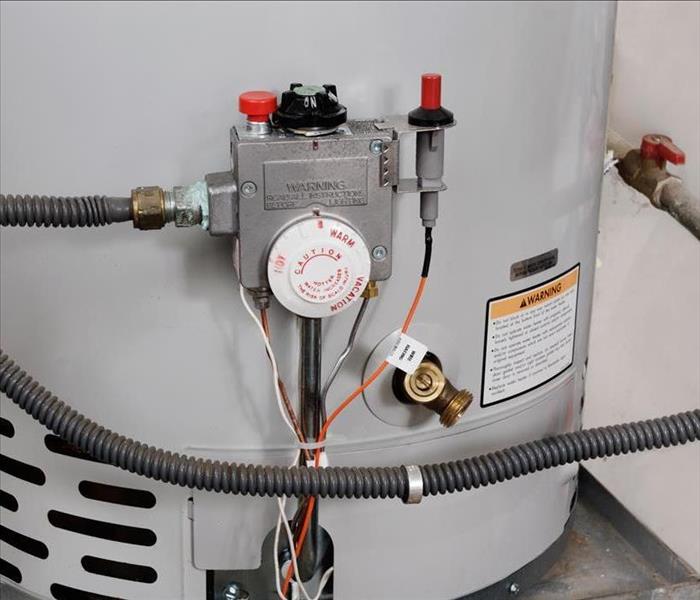 A water heater flush is needed periodically in Levittown,PA
A water heater flush is needed periodically in Levittown,PA
Whether you are cooking, cleaning, or taking a bath, you need a functioning water heater. Water heaters are useful in so many ways, but they require some attention on your part to stay working for a long time. To avoid water damage, broken parts, and hot water shortage, here are 8 steps you can follow to flush out the heater.
1. Shut Off the Power
You’ll need to turn the power off completely to begin the flushing process. If your home in Levittown,PA, has a gas heater, look for the thermostat on the bottom. If the fixture is electric, go to the breaker box and turn off the switch.
2. Turn Off the Water Supply
Next, turn off the cold-water valve. This will allow a smooth process.
3. Run Hot Water From a Nearby Faucet
You don’t want to create a vacuum within the tank, so this is an easy way to relieve the water pressure.
4. Screw On the Garden Hose
You’ll be draining the water, so find a hose that you can attach to the spigot. Find a place to distribute the water. You may need a portable pump so that you don’t cause any water damage within your home.
5. Drain the Tank
Drain the water until most of the sediment appears to have escaped the tank. You may have to drain the entire water heater.
6. Reopen the Cold-Water Supply Valve
This is the step that flushes the tank. Let the cold water run through the tank into the hose for a few minutes.
7. Close the Drain Valve
Close off the valve and disconnect your garden hose. Double check that the pressure relief valve is closed.
8. Fill the Tank and Power Up
Turn off the faucet from a nearby sink and fill up the tank. Once it is filled, open the pressure relief valve and turn the electricity or gas back on.
A water heater flush is needed periodically to remove sediment build-up and prevent a premature breakdown. Keep your water heaters in top shape to avoid problems in the future.
Noisy Water Heaters and How To Fix Them
8/28/2018 (Permalink)
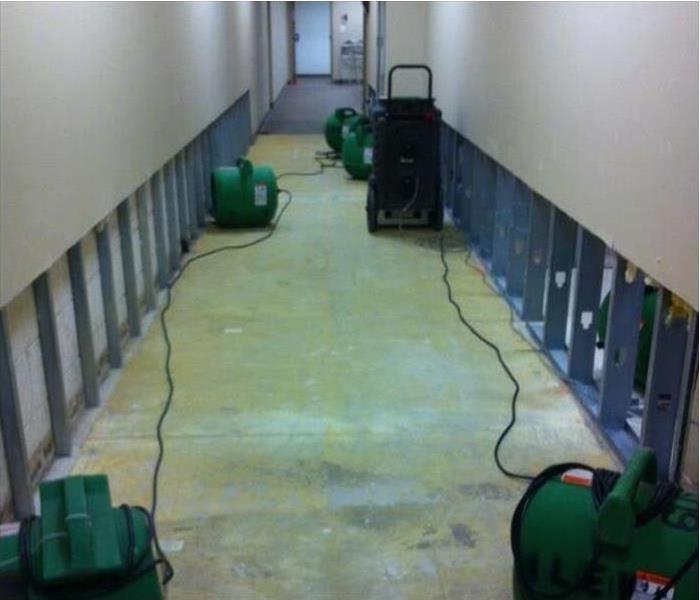 Air mover on a water damage in a Levittown, PA hospital
Air mover on a water damage in a Levittown, PA hospital
If you’ve ever used hot water in your home, then you have a functioning water heater. However, these appliances can often become noisy. Here are a few facts about these machines and how you can fix them.
What Is a Water Heater?
This appliance is a large tank that can usually hold about 50 gallons of water. Along with a drain valve, cold water pipe, and a hot water outlet, this machine is the perfect contraption for getting hot water on demand.
Water within the tank gets heated by a source of heat from the bottom. The heater is completely insulated, so no heat escapes into the outside world. Instead, it directly warms up the water. When you turn on a hot water tap, the water gets sent through the pipes to the running faucet.
Why Is It Noisy?
If you continually hear noises coming from your heater, there are two common reasons that might explain this:
- The heating element is deteriorating and becoming less efficient.
- Sediment is being burned up by the heating element.
Both reasons require action on your part. If the heating element is deteriorating, it’s probably time to replace it. If sediment is being burned up, it’s a good idea to remove it.
How Can Sediment Be Removed?
Sediment in the water heater not only makes it noisy but can be harmful to the appliance. When dirt and debris build-up, pipes can be blocked and can prevent you from getting hot water quickly. Build-up can also lead to water damage if the insulation is damaged by the sediment.
To remove sediment, you will have to empty the tank. Once it is completely empty, open the cold-water valve and fill it halfway. The stream of cold water will likely rinse and remove sediment. Use the water heater flush valve to drain the water and repeat until all sediment has been removed.
After you have successfully washed away all sediment, your water heater in Levittown, PA, should work quietly and efficiently.
Know How To Snake for the Sake of Your Home
6/25/2018 (Permalink)
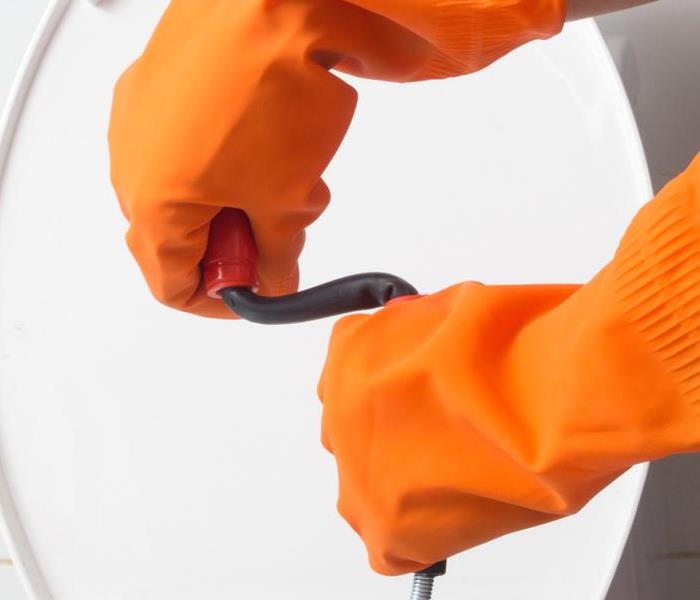
When there’s a clogged pipe that won’t respond to plunging, you should consider using a snake, a handled metal spiral tool that catches debris and brings it up. While it may seem confusing at first, a snake is fairly simple to use to fix a clog in your home using these five steps.
1. Prepare the Drain
First, you must make sure you have access to the pipe. If the clog is in a bath, you must work on the overflow drain, not the floor drain. Any stopper or drain cover should be unscrewed if necessary and removed. Any removed screws should be stored somewhere secure where they will not fall or roll away.
2. Grab the Handle, Push Down and Twist
Once gloved up, it’s time to begin. With the handle in your hands and the metal spiral facing down, feed the snake in the drain a few inches. Once it’s securely inside, begin cranking the handle clockwise while pushing to start its journey through the drain.
3. Keep Cranking
As you continue to crank, you may encounter some difficulty turning in the pipe. You may have to shake the wire or crank with a little more force using both hands. Once the snake is stopped, loosen the metal part with a gentle shake using your hand. It is time to remove what is clogged.
4. Pull the Debris Out
Now that the snake has hold of what it is causing problems, slowly pull out the metal part with your hands. Any debris that comes up should be cleaned up and thrown in the garbage to avoid it going down the drain again.
5. Rinse and Repeat Until Water Flows
The drain should be checked to see if water now properly flows. You should use the affected fixture and make sure water flows as normal. If its draining is not adequate, repeat the snaking procedure until it is fixed.
A water restoration company can assist you in restoring any damage to your home in Levittown, PA from a bursting pipe or overflowing water caused by clogged pipes. A snake, however, prevents water backup from ever leading to a pipe break. Visit http://www.SERVPROlevittown.com for more information on water damage.
How To Successfully Handle Water Damage in Your Levittown Home
5/31/2018 (Permalink)
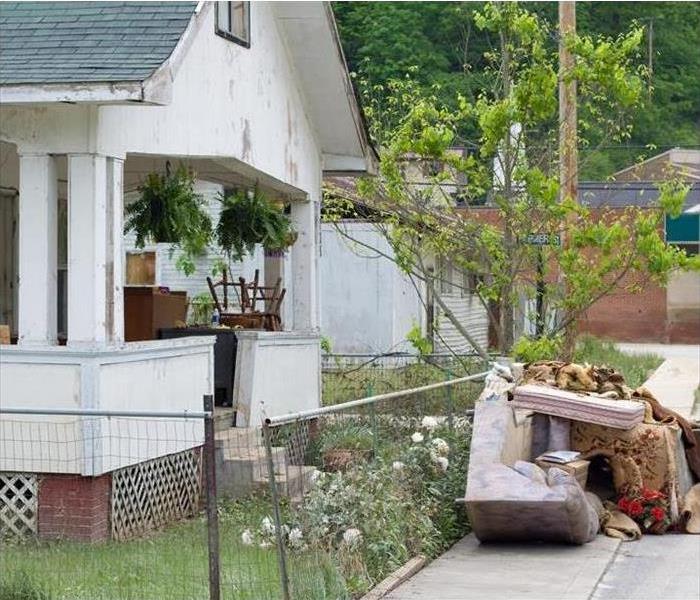 Furniture thrown outside the house due to flooding
Furniture thrown outside the house due to flooding
Plan Ahead in Levittown for Possible Water Damage to Your Home
Although many homeowners are aware of what water damage effects can be, they don't know what they would do in the event that their property is affected by it. Whether your property in Levittown becomes damaged because of a faulty appliance, burst pipe, sewage backup, or natural weather event, knowing what steps to take afterwards is important. To help you handle successfully water damage issues, refer to the following guide:
Shut Down the Water Source
As soon as you discover water damage on your property, your first course of action should be to shut down the water supply as quickly as possible. But consider safety as your first priorty to any action. Always be aware of the potential dangers of electricity. In some cases, this will simply involve shutting off your valve at the plumbing fixture or appliance. However, you may find yourself dealing with significant water damage or in a situation that precludes you from shutting off the water locally. When this is the case, you should shut down the main water line to your property. Be sure that you are aware of the location of the main water valve. This shutdown of unwanted water in your Levittown home reduces water damage to items within the homeand possibly to the structure. This action will also diminish the efforts and costs of water extraction, repair, and restoration.
Contact a Water Damage Specialist
Once your home has been negatively impacted by water damage, it's important for you to call a water damage restoration specialist. When the water damage issues go unaddressed for extended periods of time, you leave your home susceptible to structural damage and mold growth. By calling SERVPRO, you can obtain round the clock emergency services. Upon coordination with your insurance carrier, SERVPRO can immediately attack the pressing tasks to begin the restoration of your home to like the water damaging event never even happened.
Conclusion
If you find your property subjected to water damage, it's imperative that you know what to do. By reviewing the information and instructions outlined above, you can be ready when a disaster or even a nuisance leak strikes. Also, remember that it is important to contact a team of qualified water damage professionals like SERVPRO when your house in Levittown has been comprised by water damage.
Locally Owned Company with National Resources
We live and work in your Levittown too; we might even be neighbors. As a locally owned and operated business, SERVPRO of Levittown is close by and ready to respond to your water damage and flood emergency. We are proud to be an active member of the Levittown community and want to do our part to make our community the best it can be.
Our water removal and cleanup process provides validation and doucmentation that your property is dry. (215) 785-1777
Is All Water Damage the Same in Bristol Residential Homes?
5/31/2018 (Permalink)
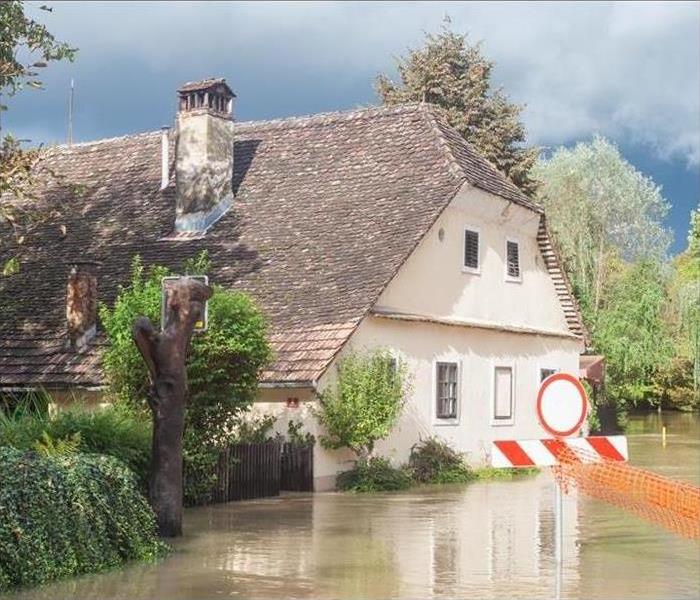 Different categories of water damage mean different ways of cleaning. A flood is a category 3 water damage.
Different categories of water damage mean different ways of cleaning. A flood is a category 3 water damage.
Different Types of Residential Water Damage in Bristol
Water Damage: Your Quick Reference Guide
After a natural disaster or pipe leak, water damage in Bristol can compromise the sanitation, safety, and structural integrity of your office or home. The longer the water damage goes unaddressed, the more problems it can present in your residential or commercial space. Thus what began as a category 1 loss can quickly evolve into Category 2 and even 3. Once this happens, your goods will be unsalvageable. For these reasons, attaining effective, immediate assistance is critically important in the 24 hours that follows the onset of water damage. Learn more about water damage and why attaining professional restoration services is important by reviewing this quick reference guide:
Categories Of Water Damage
One of the most important factors to consider when your property is impacted by water damage in Bristol is the water's category. The three categories include:
Category 1
Category 1 includes water or rain water that results from a broken sink supply line. Category 1 water is clean and poses no serious health hazards.
Category 2
Category 2 is grey water. This type of water contains a substantive degree of biological, physical, and/or chemical contamination. The water can result from factors such as a broken dishwasher drain or faulty aquarium. This type of water can pose health hazards for humans exposed to it.
Category 3
Category 3 is black water. This type of water is dangerous because it contains pathogenic agents. Unsanitary, hazardous black water results from contaminated water sources such as sewage that enter the structure of the property.
The Importance Of Getting Professional Help
If your structural contents and materials have been contaminated by black or gray water, you will be in need of professional restoration assistance. Bristol water damage remediation specialists possess the equipment, experience, and expertise necessary to properly clean, dry, and repair your property so that it is safe and sanitary to reenter and use. Attaining professional services will also help prevent expensive repair fees and secondary water damage.
When you start your search for the ideal water damage recovery specialists, the search stops with SERVPRO. Our professionals are IICRC-certified and possess advanced knowledge regarding the drying process. Additionally, we offer 24-hour emergency services for your convenience. We've helped thousands of people in your situation, and we'd be delighted to assist you as well.
Locally Owned Company with National Resources
As a locally owned and operated business, SERVPRO of Levitton is strategically located to respond quickly to your flood and water emergency event. Call us today! (215) 785-1777
A Quick Guide to Cleaning Items After Pipe Burst Water Damage
4/28/2018 (Permalink)
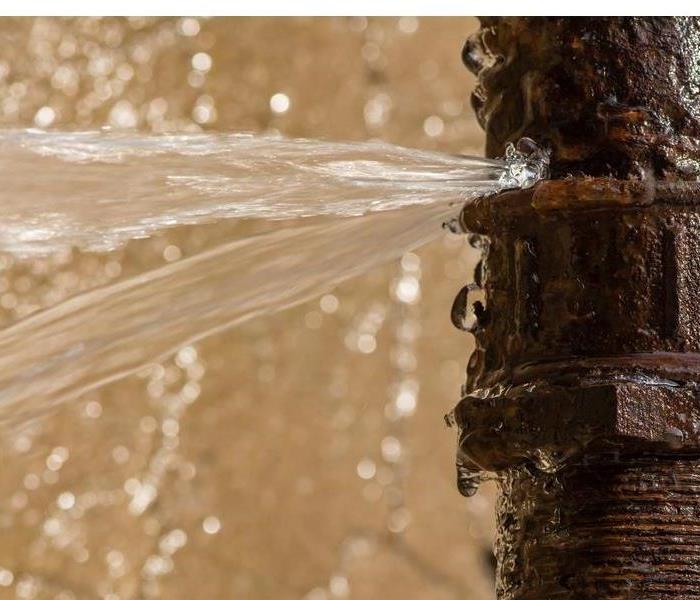 Give SERVPRO a call if you experience water damage in your home or business.
Give SERVPRO a call if you experience water damage in your home or business.
Business owners and property managers can find themselves at a loss about how best to handle a pipe burst cleanup when it floods a large area. Wading through standing water and watching items float by can be extremely frustrating. Dealing with irritated clients and tenants in Levittown, PA may add to the pressure to clean possessions, restore the area, and allow business to resume. Here is a quick guide to cleaning items after water damage.
1. Contact a water damage remediation company. Restoration contractors can offer professional advice that may save you time during the cleanup and repair process. A sewer cleanup company team can also help eliminate bacteria or viruses brought into the building by black water.
2. Remove standing water as soon as possible. Standing water can soak into floors, walls, and woodwork. Water from a broken pipe can also soak into subflooring and leak into lower floors or subbasements if left standing.
3. Separate porous and nonporous items into separate piles. Porous items such as bedding, carpet, and clothing may soak up the contaminated water and become filled with potential toxins. Porous items that encounter polluted water almost always require discarding. Clothing can be an exception to the rule, so any clothing that can be saved should be washed in hot water and detergent as soon as possible. Nonporous items can soak in a cleaning solution in a bathtub or vat until you are ready to deal with them. As soon as possible, wash nonporous items in sanitizing solution.
4. Important documents, papers, and pictures can be frozen to maintain their integrity. Place each item in a plastic bag and freeze as quickly as possible. The pipe burst cleanup team may have information on document conservation specialists in the area that can help you photocopy or photograph the documents. Some documents can even be saved entirely after freeze-drying them.
Cleaning, sorting, and removing items during a pipe burst cleanup often requires considerable effort. A knowledgeable water restoration team can help speed the process along and swiftly restore the area. Visit http://www.SERVPROlevittown.com for more information on water damage.
Stop a Leaky Faucet Before It Wreaks Havoc – Here’s How
3/21/2018 (Permalink)
A leak beneath the kitchen sink is often something that irritates most homeowners, but it is not something that concerns them. It should be, however. A leaky kitchen sink that is not taken care of can result in gradual water damage (which is not covered by insurance), costly kitchen repair and possible flooding. If you notice a leak in your kitchen pipes, you need to take the following steps right away to prevent further damage and to ensure that any damage sustained is covered by your insurance agency:
1. Shut off the water valves
2. Contact your insurance company
3. Reach out to your Levittown, PA water restoration company
Water in the Home Should Not Be Taken Lightly
Serious water damage is not just the result of a sudden deluge of water. Rather, most water damage in homes is the result of ongoing moisture problems. One of the most common problems can be found beneath the kitchen sink.
In addition to structural damage, a leaky pipe can result in mold growth, which can quickly spread beyond the beneath-the-sink-area, and pipe burst. If a pipe burst occurs, your problems become much worse and much costlier, as now you have to deal with flooding and not just a few annoying drips.
How To Spot a Pipe Leak
If you cannot hear the pipes dripping, there are a few signs you can look for to spot damaged pipes. Those include:
• Wet carpet around the area
• Bowing floorboards around the sink
• Soaked items beneath the sink
• Cabinet or floor discoloration
• An unusually high water bill
If you notice any of the above and cannot figure out the cause, check your pipes. If you do not notice a leak when the water is on, the problem may be a faulty seal, in which case you would need to fill the sink basin and wait for it to drain.
If you have a leaky pipe, it is imperative to take proper kitchen repair methods right away, otherwise you risk flooding. Once you’ve shut off your water valves and contacted your insurance agency, reach out to your Levittown, PA water restoration team for restoration assistance. Visit http://www.SERVPROlevittown.com for more information on water damage.
Why You Need Professional Water Damage Restoration
9/26/2017 (Permalink)
Why You Need Professional Water Damage Restoration
Water damage is something that can affect homes all over the world. One of the main issues with water damage is that it can be problematic down the road if professional mitigation and restoration is not done as soon as possible. Water cleanup is often best left to the restoration company professionals. You should never attempt to do the drying and water clean up on your own, especially if you are currently dealing with a lot of water in your home or currently have a ton of water in your business.
Drying, mitigation and restoration are all important aspects of the water cleanup process. Without all of these things combined, you are going to be left with a home that has simply dealt with a supply line break or pipe break and significant water damage as well as flood damage. Some people also deal with flood damage because of where their home is currently located. If you live near the water, flood damage is a lot more common than other types of natural disasters.
How to Deal with a Flooded Home
If you currently have a flooded home and have dealt with significant amounts of water in your business office, it is time to hire the mitigation experts. Water damage should never be cleaned up by your own two hands, simply because you do not have the tools or skills necessary to do the proper drying. Water cleanup can also be quite expensive, so it is important that you contact your local insurance provider to see if flood damage is covered under your policy.
Often times, the water damage and flood damage is caused by a supply line break or pipe break that is underneath your house. This is obviously going to need to be looked at by a plumber, but you still need to contact the mitigation experts as well as a local restoration company. You're flooded home can easily benefit from proper drying and water cleanup when it is most convenient for you. Restoration can be incredibly affordable if you go with the right company.
If you have water in your home right now or have recently had water in a business office that you own, it is imperative that you have restoration done by the professionals. The professionals will do all of the flood damage cleanup for you at a price that you will be able to afford. A flooded home is no joke, and it can get much worse if it is not properly taken care of after dealing with a supply line break or pipe break. Whether it is water in a business office that you have right now or water in your home, it is imperative that you hire a restoration company to do the work for you.
The supply line break as well as the pipe break that you have dealt with can easily be taken care of by the restoration company as well. The water in your home should be removed as soon as possible to prevent further damage from happening. This is something that most homeowners simply do not have the skills or tools necessary to accomplish. Because there are so many different restoration professionals out on the market, it is so easy for you to contact one of them and have them come and do the job for you.
Be sure to contact several company so that you can get a quote for how much the work is going to cost. You will be amazed to know that there are lots of different options available to you, making it easy and effortless for you to finally get your home or business back on track after dealing with a significant flood. Whether this flood was caused by a pipe issue underneath the house or office, or you live in an area near the water, having the experts there to help puts your mind at ease significantly.
Visit http://www.SERVPROlevittown.com for more information on water damage.
Top Notch Tips on Professional Water Damage Restoration
8/30/2017 (Permalink)
Top Notch Tips on Professional Water Damage Restoration
Currently, the major disasters facing the entire globe is the water damage caused by pipe break, flood damage, supply line break, fire, and storms. Other scenarios like tornadoes and hurricanes cause significant water spoilage disasters. However, upon the occurrence of the water break, the quick address of the matter helps in renovation of the building structure. For efficient water cleanup, contacting an expert is essential.
Instant Steps of getting over Water in home and Water in Business
First, on reporting the water dent matter, a restoration company will implement a mitigation plan to dry, extract and dehumidify the flooded building. Furthermore, they take quick steps to prevent any further damage to the building as well as eradicating any water in business. Experts are in ownership of a moisture cleaning equipment to help in detection of places in flooded by the water that the house owner can’t see like the walls and ceilings. Water in Business is hazardous as it destroys the business items.
About Water Damage refurbishment and water cleanup
Water spoilage is the destructive processes that occur when water intrudes into a building. Examples of the water deterioration include the rotting of wood, microbial growth, oxidation of the metal and delamination of the composite construction materials. The immediate leakage from pipe break is the beginning of the natural chemical reaction. Unaddressed flood damage because of a tube break in a residence can cause the complication of the structure.
Additionally, the overstaying of a flooded home without any renovation makes the area unsafe for human occupation. Probably, flood water contains chemical, biological, and physical elements that are hazardous.
Water Damage re-establishment Process
Water cleanup requires a knack for details. First, the initial step of the process is the emergency contact. People refer it as emergency mitigation. Water cleanup involves summoning a licensed professional to undertake the general services. The restoration company expert locates the pipe break. Furthermore, he or she assesses the damage and danger to the humans. Thorough inspection and assessment help in the creation of a plan of action.
Water extraction or removal is the next step after mitigation. It involves removing thousands of gallons of water from supply line break using powerful pumps and vacuums. The procedure is meant to minimize any further water dent and help in the molding of growth. It is one way of getting over the flood damage since water in business results in low-income rates.
Drying and dehumidification are the third steps. After removal of the bulk water, the experts used specialized equipment to remove water that is harder to access. Many developed water companies use the scientific drying methods in drawing the remaining water and moisture. The majority of the professionals use dehumidifiers and air movers to dry off the water.
Another essential step is cleaning and sanitizing. Since the water break from pipe break can damage the house owner’s belongings like clothing, furniture, and other personal items, professionals used specific techniques to clean and restore the damaged items. Also, they perform the sanitation process using antimicrobial treatments. They also remove the odors by using flogging equipment and industrial air scrubbers.
Restoration is the final step. It involves restoring the water in home and water in business back to its normal operation. The restoration process can be carried out by replacing the drywall panels. For the major constructions, rebuilding the entire rooms or business will be in consideration. In short, flood damage from the supply line break needs a lot of restoration of the affected area.
Mold Remediation Services
The services are under restoration consideration to prevent long term health effects of the microbial growth, associated with the water spoilage caused by supply line break. The procedure is in measurement regarding days, not weeks. To avoid the development of the mold in the flooded home, seeking for the immediate response from the water experts for drying is the most critical solution.
Contracting and Reconstruction Services
After the water clearance from the flooded home, contraction and reconstruction services follow. It involves the construction of the areas that after the water clearance from the flooded home, contraction and reconstruction services follow. were significantly damaged by the water during the flooding. The essential procedures that should be in inclusion are structural repairs, interior finish work, demolition, code compliance, and plumbing.
Every water in home event needs a unique solution. With the expertise and the right equipment, it helps a great deal in quickly resolving of the pre-water damage condition. The introduction of the scientific approaches also helps in improving the efficiency of water drying. Contacting a well set up restoration company also help in quick mitigation of a flooded home. More information is on the water in home sites.
Visit http://www.SERVPROlevittown.com for more information on water damage.
Different Types of Water Damage
6/21/2017 (Permalink)
Different Types of Water Damage
Water damage is the loss that someone incurs whether small and slow or instantaneous and catastrophic when there is water in home or water in business. Water damage can be caused by leaking pipes, a clogged toilet and sinks or an overflow from washing machines; that is if it’s manmade. Flood damage can also be from natural causes like heavy rains and river, this one most of the time happens fast. Flood damage is mostly catastrophic and it may lead to a lifetime loss of property and assets. It may affect only one home or a whole region.
There are several different levels of water damage which depends on the type of liquid involved.
• Category one level: in this category, the liquid is clean and it may come from toilet tanks, drinking fountains and faucets.
• Category two: here water is a little contaminated; they are mostly from dishwashers, washing machines, and clogged toilets with no feces. It is also known as grey water.
• Category three: in this category the water is unsanitary and is harmful to the body if consumed. This maybe from seawater, sewage spills and stagnant water. It is also known as black water.
Water in home may be classified according to the evaporation rate, the area size of the room affect or the wetness of the area while this is completely different from water in business. These classes include:
• Class one:in this category , the water in business premises and water in homes may cover small portion of the room is affected, the evaporation rate is slow and the material affected has low permeability.
• Class two: in this class the entire room is affected, the rate of evaporation is a faster while the water in the home covers up to 24ft high.
• Class three: here water evaporates much faster than class two and it affects the whole area including the ceiling and the roofing.
• Class four: this class is when water affects a very low permeable material such as concrete and hard woods. Drying is the only way you can control this type of damage.
After flood damage has occurred there must be water cleanup in the affected areas, this water cleanup procedure may require special tools and professionalism will undertaking them. These water cleanup procedures include mitigation and restorations.
Mitigation
For mitigation to happen drying must have been undertaken. Mitigation is the processes of reducing or preventing more water damage to the already damaged things by taking fast and appropriate actions. The following are the steps taken during mitigation:
• Close any water or any flooding gate so that water stops coming in.
• Shut down and remove any electrical devices from the wet areas or the submerged areas
• Use aluminum foil to cover the feet of the furniture to prevent permanent stains.
• Remove shoes, books, potted plants or anything that is able to stain the carpets.
Restoration process
Liquid damage is unique and it requires its own way of restoration although it follows the same procedure. The process of restoration includes:
• Inspection of the damages and assessment: this is whereby the category and the class of the damage are observed. Also it’s where you stop the source and check for water contamination. Generally this stage is where mitigation is applied.
• Water removal: if the water in the house is as a result of leakages and overflows we use simple equipment such as mops, However if it’s of class two and three the use of sophisticated materials such as pumps and wet vacuuming equipment is used.
• Drying and dehumidification: building materials such as woods and concrete are porous and will require drying to remove all the moisture in it or else it will warp, rot or mold. Carpets that is soaked for less than 24 hrs is easy to manage as you can sundry it. Timber and concrete walls on the other hand requires special equipment to dry them (air movers and dehumidifiers).
• Cleaning and sanitizing: areas with flood damage require to be cleaned. Personal things may require more attention during this water cleanup process.
• Repair and reconstruction: here damaged walls are painted or replaced depending on the extent of damage; carpets are newly installed or repaired to its old form.
In conclusion this water cleanup procedure requires qualified personnel and should be undertaken cautiously especially if there is water in business.
Visit http://SERVPROlevittown.com for more information on water damage.
The Effects of Water Damage in the Home and How to Deal With It
5/23/2017 (Permalink)
The Effects of Water Damage in the Home and How to Deal With It
Let's face it, flood damage and water damage can be the downfall of your home. Whether you're living in a flood zone and regularly see rising water in the home itself or you've just dealt with a burst pipe, the damage that the water leaves behind can be devastating to say the least. There is more to water damage than sopping wet carpeting and destroyed photo albums. The damage can have long-term effects that can quite literally be the ruin of your residence.
Dealing with a Flood - Problems Encountered
Whether you're dealing with water in your business property or water in the home, the effects are still the same. Flood damage destroys flooring, carpeting, walls, insulation, electronics, electrical wires and furniture. It can have long-term effects, like you'd find when your home or business begins to deal with a massive mold growth problem months after a flood hit the property. Restoration and professional mitigation is essential for reclaiming your home or office and getting it back to new.
The best way to handle flood damage and water damage is to thoroughly dry out the area and to prevent excess water from reentering the residence. This might mean that you'll need to install a better drainage system on the outside of the home or use a barrier method around the perimeter of the property. The key is to keep flood waters out of the house or business office, thus preventing future problems from forming.
Working with a Professional Mitigation Company
A professional mitigation and restoration company takes care of flood damage and water damage for you. They use all of their own drying and water cleanup techniques to ensure that your home is cleaned properly. Unfortunately, during the water cleanup process, they may need to remove and throw away certain items. This might include the carpeting on your floors or the insulation behind your walls. Mitigation and water cleanup companies work to get rid of the water source and any damage left in its place. This prevents mold growth from forming and becoming a problem for you down the road.
Restoration and water cleanup can be difficult to accomplish on your own, especially if you don't have the proper drying tools available or the skills necessary to assess damage, so it's important to contact a local restoration company before attempting to do the work yourself. Sure, you'd save money by making it a DIY project, but you might not have the water cleaned properly and this can result in future damage that costs more than hiring a remediation service.
Coverage and Payment Options
Chances are that if you're paying rent or have a mortgage, you'll have coverage on flood water in your home or water in your business. This means that if you're dealing with a flood that creates excess water in the home or water in your business property, the insurance provider will partially or fully cover remediation and drying services.
You will need to contact your insurance provider to find out about your policy and what will be covered concerning water in your business office, but it will be well worth it when you consider the overall price of remediation and drying services. If you do not have coverage on your home or business, you'll need to work with the remediation company in order to agree to a payment option. They may allow you to pay for their services over the course of a few months or years, depending on how much the project is going to cost you. Even though it can be costly to have the flood damage professionally repaired, you're guaranteed that it is going to be done properly and will not cause future problems from forming due to forgotten water in inconspicuous areas of the home or office. Preventing major flooding issues is also important when fully protecting your property.
Visit http://SERVPROlevittown.com for more information on water damage.
How You Can Have A Water Damage Mitigation Plan When Disaster Hits
4/28/2017 (Permalink)
How You Can Have A Water Damage Mitigation Plan When Disaster Hits
Whether you live in an area that experiences a lot of rain or a drier area of the country, there's always a good chance that you'll experience flood damage from water in your home or water in your business. Often people don't have any mitigation plans for water damage until it's too late, and sometimes without knowing better they try to perform water cleanup themselves and end up causing more problems and ending up with a longer water damage restoration process than they had planned on. But if you know what to do you can save yourself a lot of time, headaches and even stay safe when you have out of control water in your home or water in your business.
One of the first steps in a water damage situation is to have a water cleanup professional in your directory who you can call immediately. Most water damage restoration professionals will arrive quickly at any time of day or night and can start the air movement and drying processes immediately, so it always pays to do your research on a good company immediately. Some companies may provide you with free water damage quotes and even put the flood damage cleanup bill on your home insurance policy. If you don't have water damage or flood coverage on your insurance policy, you might want to consider getting it if you can.
One of the first steps to stopping water in your home or water in your business from spreading any more damage is to try and cut off the source. If you suspect it's coming from a water supply valve or leaky pipe, you should shut off your supply valve if you can get to it to start the mitigation process. Be careful about going into areas where flood damage has severely affected the interior such as floors or ceilings or has spread mold or mildew so that you aren't entering a dangerous situation. If you notice any strange smells or suspect structural damage has been very bad, you should evacuate your home immediately. You can help the drying and air movement process though by opening windows and doors and waiting till the professionals come.
You should not use any regular household tools such as vacuum cleaners or hair dryers for drying or air movement in your home. Not only are these tools not designed for water cleanup, but any further damage may not be covered by homeowner's insurance. Water damage restoration professionals have extensive training with certified extraction tools and cleanup equipment to make the drying and air movement processes go faster. They've often addressed flood damage many times before and not only are they trained in safe methods, they usually can repair some structural damage to your home if flooding has caused cracks in ceilings or floors.
During the mitigation process, you may need to remove certain belongings from your home to a storage unit or someplace else that's dry, and if necessary you may want to ask the professionals how certain household items should be dried. You also might be told what actions should be taken such as having a new rain gutter, or new seals on windows or pipes replaced to prevent future damage from water in your home or water in your business. Water cleanup is never fun to deal with, but having a mitigation plan and water damage restoration professionals always a call or click away is one way to make the situation less stressful. Visit http://SERVPROlevittown.com for more information on water damage.
Water Damage Remediation and Home Insurance Claims
4/28/2017 (Permalink)
Water Damage Remediation and Home Insurance Claims
Water damage is among the most common home insurance claim causes. With electronics becoming an integral part of our home, water damage restoration becomes of essence. While the right home insurance might alleviate the cost of mitigating and water damage restoration, it won’t save you the inconvenience that come with water damage.
What Does the Home Insurance Mean?
Most of the home insurances with flood damage cover will help you pay for the water damage recovery as long as you contact them in time and use the right contractor to handle the water cleanup. Our expertise as flood damage mitigation recovery has earned us a reputation with insurance agencies. This means that our damage assessment reports together with the mitigation plan created will be considered and respected by the insurer when putting value to your water damage restoration claims.
Since our goal is to help homeowners and business people recover from water in home or water in business faster, we try our best to adapt to local insurance payment procedures so as to keep the job going without forcing the client to dig into his or her pocket to foot the water cleanup bills.
We Will Help You Understand What is Covered
Water damage restoration insurance covers are tricky. The biggest clause most people have to struggle with is the gradual damage clause. Most of the insurance covers will be fine when dealing with flood damage where the water in home or water in business premises was due to heavy rain or a plumbing damage that lead to almost instant flooding.
You will, however, have trouble filing a claim when the damage was spread over a couple of months or years. This could be due to plumbing faults that made water leak into the house slowly.
It is our responsibility as the water damage mitigation crew to ensure that this doesn’t happen to your home. The fact that you have dealt with legitimate flood damage doesn’t mean that you can’t suffer from gradual damage no mater how thorough the water cleanup was. Our experts will not only use equipment in drying your property but also advice you on how to improve air movement to ensure that the water in home or water in business premises doesn’t carry on.
How do We Do It?
Our water mitigation process involves the use of pumps to drain off extra water in the house before using industrial grade fans to encourage air flow and accelerate the drying process. We can also use other techniques useful in drying your dry wall or wood floor faster and ensure that you get back to normal life as soon as possible after the water cleanup.
We have been in the industry for a while now and we know how to help people recover from water in home or water in business areas in the most effective way possible. Couple this with the fact that we not only have the right air movement and drying equipment but also understand how insurance claims and you will get an adviser who will not only help you get the job done but also show you how to make your insurance provider pay. Visit http://SERVPROlevittown.com for more information on water damage.
Staying Safe Around Electronics During Water Removal
9/20/2016 (Permalink)
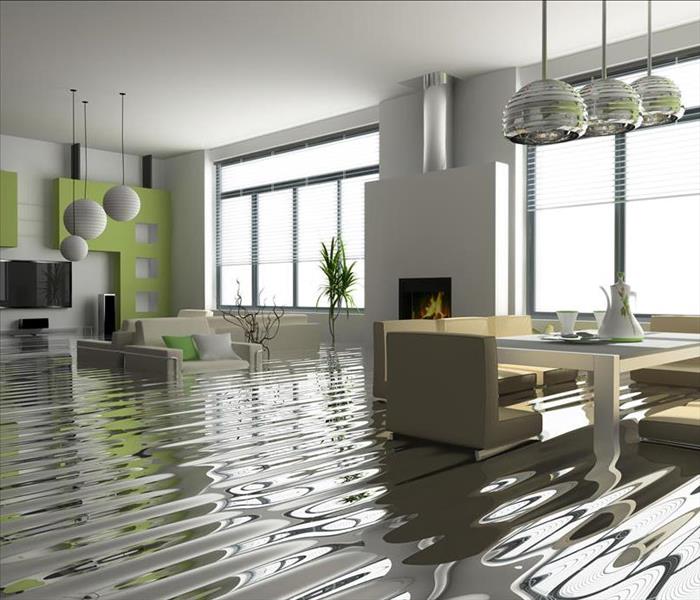 Wall outlets present a major hazard, particularly in homes with children, and in the event of flooding not even a plastic safety cap can ensure safety
Wall outlets present a major hazard, particularly in homes with children, and in the event of flooding not even a plastic safety cap can ensure safety
Being Safe Around Water Removal and Electronics
When dealing with flood damage (or any heavy water damage, for that matter), extreme caution must be taken when dealing with the risk of electrocution and shock. Water is highly conductive to electricity, and high waters can claim lives if you're not prepared for the risks that may lie within. Never attempt to use an electrical outlet following water damage in that area, never wade or walk into floodwaters, and try to stay away from wet areas in general until we can assure you that there is no electrical hazard.
Wall Outlets
One of the primary reasons why fast water removal in Bristol is necessary in the event of a flood is to reduce the risk of electrocution via wall outlets and plugs. When submerged in water, these can deliver extremely high voltages of electricity, enough to seriously injure or kill in addition to causing serious burns. Wall outlets present a major hazard, particularly in homes with children, and in the event of flooding not even a plastic safety cap can ensure safety in deep waters. Always wait for our SERVPRO technicians to remove and dry off all water from a room before entering it in order to avoid electrocution.
Electronic Devices and Appliances
Some electronic devices, appliances, and furniture pieces may also present significant hazards even when an area is not flooded. If sufficiently soaked, everything from lounge chairs to televisions to kitchen appliances can present a life-threatening hazard. Items such as speakers or video game consoles which lie on the flood can also present serious dangers even after water has been pumped, as they may have a loose electrical cable or circuit which connects to wetness in carpet or on flooring.
Locally Owned Company with National Resources
At SERVPRO of Levittown, we make sure to equip our technicians with the latest and best in safety gear in order to keep both them and your home safe from electronics when dealing with water damage. Call us 24/7 for emergency mitigation and restoration services at (215) 785-1777.
Homes Affected by Water Damage – Clean Up by Professionals is the Best Way to Go
7/28/2016 (Permalink)
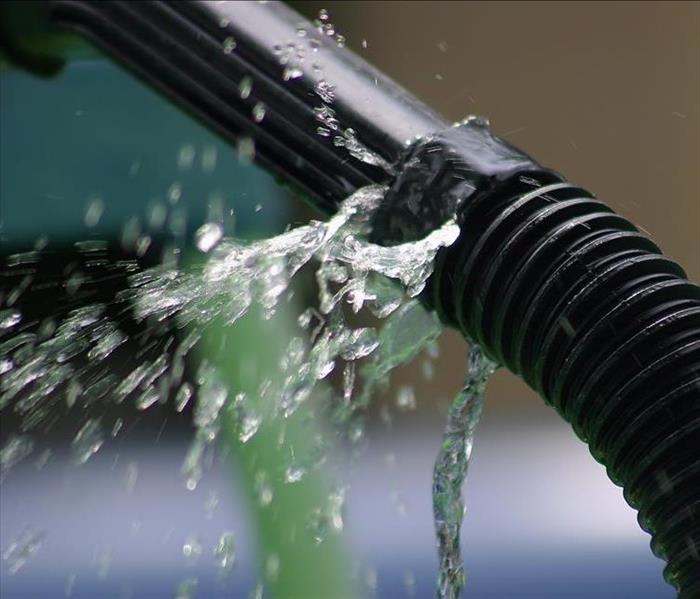 Water Leaks from a Drain Hose Causes Damage in Fairless Hills
Water Leaks from a Drain Hose Causes Damage in Fairless Hills
SERVPRO Offers Professional Water Damage Restoration Services
Water damage can happen any time of the day or night, and can stem from a small overflow of a tub, or a larger amount from a broken water line. Water can seep into the tiniest of cracks and seams in walls and floors, causing problems in the future. Water that is left and not removed or extracted can cause supportive structures in your home to rot and weaken, and can also cause drywall to deteriorate and crumble. Tenants, and also many homeowners, do not realize that even small amounts of water can lead to high monetary expenses.
Be Wary of Any Water that is Not Contained as it Should Be
Water damage in your Fairless Hills area home is not a minor problem, although it may seem like it is. Even if there is a small amount, it is highly recommended that you have an inspection done. This assessment will provide you with an accurate picture of any existing water that may cause future problems, and also one of existing damage, in the event water has been steadily, but invisibly, leaking behind a wall or under a sink or toilet.
Clean Up by Professionals Certified in the Latest Technology
SERVPRO professionals are provided training in IICRC methods and the use of state-of-the-art equipment. This skill set assures that residents and business owners are provided with the highest level of service possible. Water damage does not only create structural problems – it can also create the perfect environment for mold proliferation. We can detect higher than normal levels of humidity that can cause moisture problems in other areas of the home or building, thereby mitigating water damage.
We can provide services, from removal to moisture control, when dealing with all size water damage. Floods, contaminated Black Water, to small leaks spilling clean water are what we handle. While a small leak may allow clean (tap) water to spread across your home's floor, we know from experience that mold has no preference between clean or dirty water – both will allow mold to grow rapidly, as soon as 48 hours after the water is introduced to your home's interior.
For fast service, contact SERVPRO of Levittown at (215) 785-1777, 24/7. We will have your home back to a comfortable and habitable state quickly, preventing any future problems that may affect your home's integrity or your family's safety. "Like it never even happened."
Water Removal For Your Home
3/23/2016 (Permalink)
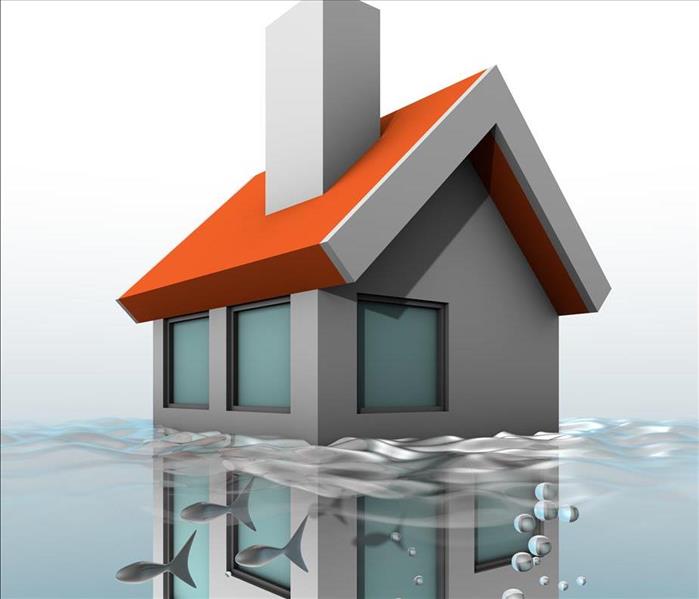 Water leaks from homes in the US can exceed 1 trillion gallons of water in a year.
Water leaks from homes in the US can exceed 1 trillion gallons of water in a year.
Residential Water Removal
There are many reasons why you may encounter a lot of Levittown water damage in your home. It may have been because of a flooding of a local river or stream. It could have been due to a storm that left the entire area drenched. This rapidly forming swimming pool in your basement may only be attributed to a leaking pipe or broken faucet. It does not matter what the cause, you need to get attention to your situation fast for water removal in Levittown.
The reason that it is critical to get a professional restoration team in and to work as soon as possible is that all of the building materials, such as wood, drywall and, if the water source is on an upper level, all of the ceiling panels, are going to be absorbing this water. They are going to get waterlogged and begin the process of breaking down and creating an unsafe environment.
The presence of mold spores, all around outside, coming in with that water, also presents a particularly dangerous situation for your health and well-being. It is critical that steps are taken immediately.
For your part, you can get the water source turned off if it is simply a burst pipe or broken faucet or appliance. Then a call to your insurance company is appropriate. They send a representative, and a call to a restoration company can also get them there fast. The professionals know that the water removal in your Levittown home is important to you, and it is the reason for being there.
The first thing that needs to be done is a quick but thorough inspection of the entire structure, whether home or commercial building. The trained, insured and bonded technicians have the testing equipment and experience to find out where the water is, even if it is not visible, as some can be inside of walls and below floors and in everything else.
The goal of this inspection is to determine, first, where the water came from, if not obvious, and plan the program for getting you back in order. The testing equipment will find even the smallest amount of moisture that can harbor that mold and be the source of continuing odors for quite some time. At the same time, powerful air movers, or fans are installed to begin the process of removing the odors that are present which help create the bad air.
Vacuums are brought in for the Levittown water removal, occasionally consisting of submersible pumps and always the wet vacs that are attached to the truck outside. Restoration technicians have a lot of experience in getting everywhere, thus removing all standing water quickly. The dehumidifiers are set up to assist them in this work.
Part of the inspection and water removal job is locating and eliminating those elements that can not be cleaned properly. This may include portions of the wall, ceiling and any furniture that has been water damaged beyond cleaning or repair. This disposal work contains the items removed so as not to infect any other spaces in the home. The special licenses required to dispose of this material, in authorized locations around the city, so to protect the environment.
The cleaning and sanitizing work is carried out so that every surface is as it was before the water damage came in. Every surface is done to ensure a clean, safe and healthy home for you as quickly as possible.
Locally Owned Company with National Resources
When you have a water damage event in Levittown, Oxford Valley or Fairless Hills please do not hesitate to call SERVPRO of Levittown at (215) 785-1777.
How to Prevent Water Damage to a Finished Basement in Levittown
2/24/2016 (Permalink)
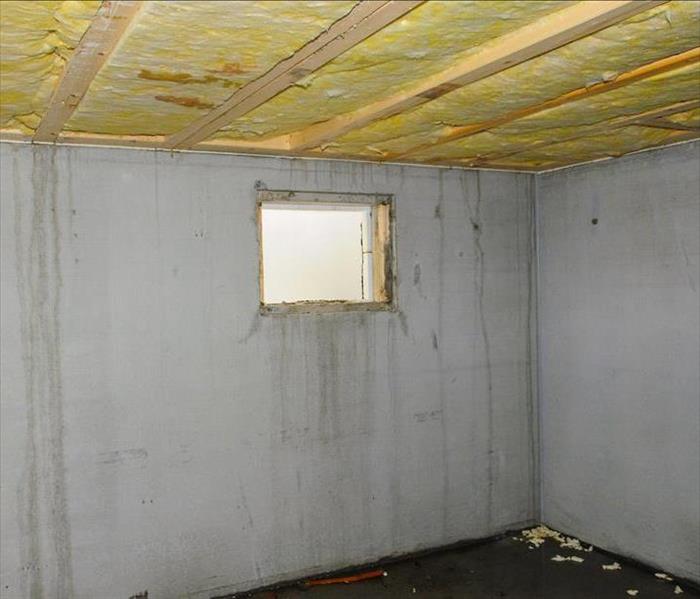 SERVPRO Can Reduce Moisture Levels in Your Basement
SERVPRO Can Reduce Moisture Levels in Your Basement
A Basement in Levittown Is Where SERVPRO Can Help Prevent Water Damage
Don't let possible water damage to a Levittown basement keep you from expanding your living space. It is not unusual for growing families to agonize over home extensions and expansions. Are they worth the investment? Can you guarantee that they will add value to the home and not remove it? Where is the best place to put an extension? The real question is, why sink money into an expensive construction project when you can make use of space already included in your home? If you have a basement, and it is currently sitting unused and unloved, it is time to turn that empty space into additional living quarters.
It's incredible what improvements you can make to a basement or subterranean utility room to make it usable. However, you must always remember that it is below ground. It will be more at risk from flooding and water damage than any other part of the house, so it is important to take the right water damage prevention measures.
Fixing Masonry Foundations
This type of foundation is prone to developing cracks at the mortar joints. The quickest and easiest way to stop water from seeping up through the holes is to apply an external waterproof ‘skin.’ To do this, you will need to contact a contractor for help. You may also need to consider your basement as out of action for a short while.
The contractors will excavate down until they reach the foundation footings. Then, they will scour the foundation, before adding a sturdy external ‘skin’ to the outside wall. This is designed to waterproof the whole basement area below and at the grade level.
Fixing Non-Structural Cracks
A crack in the foundation of a house can seem like a scary thing, but it does not necessarily mean that the integrity of your home was compromised. The vast majority of structural cracks are primarily aesthetic. They can still allow water seepage, however, so you must fix them quickly. You can do this by drilling a small hole close to cracks and filling it with sodium bentonite clay. This material will soak up the water and prevent the basement from flooding or leaking.
Concrete Crack Injections
If your basement floor was poured concrete to establish the pad, you might need to use a slightly different method. Anywhere that you find a crack developing, carefully fill it with an epoxy or a polyurethane substance. In a lot of cases, you will be better off seeking outside help from a professional water damage restoration company like SERVPRO. We can inspect your basement and house to determine the best course of action.
Water damage in a Levittown basement may develop from excessive moisture or accumulated condensation. SERVPRO of Levittown can install a dehumidifier to ensure suitable levels of humidity are achieved and maintained. This will improve air quality, lessen potential water damage to walls and furniture, along with suppressing mold growth. A sump pump may be an additional device to install in case of flooding or frozen pipes. If you do need water damage restoration call us and we will always return your home to pre-loss condition "Like it never even happened."
Highly-Trained Water Restoration Specialists
We are water damage specialists. SERVPRO of Levittown starts quickly to get your basement dry and back to pre-water damage condition. We proudly service Levittown, Bristol, and Morrisville for all mold, fire, and water damaging events. Call us 24/7 for help. (215) 785-1777






 24/7 Emergency Service
24/7 Emergency Service
